#dying is a shared experience that is the ultimate unknown
Explore tagged Tumblr posts
Text
Something about this year sapped what was left of my will to live. Not in a way where I’m going to do something final about it, but in a way that has left me not much more than a husk. Mortality hit me. Mortality sank into my weary bones. Those bones that unwillingly trudge towards the grave.
What’s after this? Probably nothing. Hopefully something. But according to the anecdotes of those who died but were brought back, there’s nothing. A peaceful, comforting nothing. The final act of passing on sounds like the best sleep I’ll ever have, and that’s relieving in some way. Dying does not shake me, but death does. It’s something carnal that gnaws at the back of my mind. I don’t want to stop being me. I don’t want this to be over. I don’t want to leave behind this life I’ve got, these people I’m close to, these hobbies I care about. And the thought of mortality, of how unavoidable it was, it hollowed me.
A skeleton sits in the chair where I once did. The joy of hobbies no longer meaningful, and the time spent with others feeling pointless. A life with no color. I want to see the world heal. I want to see myself heal. But to what end is all this for? My body grows weaker as time goes on. I will age, get sick, and wither away. If this doesn’t get me, something else will in due time. And yet, I continue to trudge on, still feeling some odd drive to move forward. To pursue hobbies, friends, life.
To persevere, despite my weary bones, towards the grave.
#writing#death#tw death#idk needed to muse about this somewhere#this pandemic has caused me to think about death way too much#dying is a shared experience that is the ultimate unknown#and no one wants it#tiredcat writing
0 notes
Text
Okay, so I've come up with a mystic messenger horror AU that I'm tentatively calling the Meatverse (ugly name, I'll think of something better later), and I don't have the energy to actually write multichapters, what with juggling making games and getting fired, and drawing gore is not really my strong suit, but I'm DYING to share it. So you'll have my bullet points for it, unedited.
The worldbuilding:
In this au, the world exists on more than just physical level, or plane. In fact, it is divided into two: the cortex and the Red matter, or Meat. All the world as we know it is the cortex, and the discovery and study of the Meat are top secret and virtually unknown. The Meat is a nether layer of the world, inner and hidden, formed by subconscious desire and trauma, where intangible and psychological things are made manifest. It looks literally like the world made of meat and viscera, all pulsing and alive.
Inherently, The Meat is neutral, but it is way more malleable than the cortex, and thus more easily corrupted, and the corruption of the Meat is extremely dangerous to the cortex, which is part of why the existence of the Meat is the secret so heavily guarded
Cortex is the layer that, on the one hand, protects the Meat, and on the other informs it and changes it.
The Meat carries the historical memory, integrates experience, and shapes the future of the cortex. The Meat is responsible for group mentalities and generational trauma
Although formal study of the Meat is secret to the public, there are people who stumble into it by accident, or secretly search and study it on their own. Such individuals are secretly hunted
Sometimes, as a result of experiences, humans become vulnerable points, where the membrane of the cortex wears thin. Such persons become able to greatly affect The Meat, and thus shape the fates of the world. The danger is, they can use it for good or for evil, and their actions are often informed by their experience
The background:
As a result of her upbringing, Rika becomes a vulnerable point, and starts profoundly feeling the effects of The Meat. As a traumatised person, the signals that she is able to accept from Meat are mostly downward trends and experiences of suffering that echo her own on a greater scale. As she begins contemplating suicide, she starts to secretly hang out with the people on the margins of society, on the lowest, bonding with them over their shared experiences. There, she befriends a drug dealer who experiments with less known substances. Once, he tells her about a very dangerous, potentially deadly mixture, which Rika persuades him to let her try.
When she tries it, the mixture alters her vulnerable point state, and Rika witnesses The Meat. For a brief moment, she is scared, but then she immediately becomes fascinated by it. She quickly understands the workings of The Meat and how it is connected to cortex. She spends some time studying it.
After a while, with her studies and drug usage, she furthers her vulnerable point state up to where she could see The Meat at will, without having to rely on either substance or state of mind. She was her own guinea pig, and then later she also recruited the dealer. She searched for ways to bring him to Meat with her, and found that torture and pain were a quick way to create a vulnerable point.
She also wanted to bring V with her, which is where all of their weird conversations about hurting each other came from. But she hated hurting him for a while, and she tried other ways which ultimately did little to create in him a point of vulnerability.
She discovered that Saeran was another Point, and saw in him a prodigy. She used him, however, to try and find a way to make V a Point. Ultimately, when she hurt V and left, that was her way of creating a point of vulnerability, but she didn't want to see it made.
She had Magenta built and created Mint Eye as a twisted way to create a big cluster of vulnerable points, which she would then basically lovebomb, using that as means to bring profound good to the world via Meat. However, for her plan to succeed, she had to create a space of suffering first, which is why she confined her cult to the mansion, to make sure the evil didn't leak. Only the cleansed vulnerable points were allowed out for recruitment, those that did not ooze pain any longer. Those, however, were mostly very broken people, absolutely incapable of any meaningful action at all.
The elixir is used in Mint Eye as a gateway to Meat
Basically a lot of what Rika did there was not just for the 'greater good', but also to bring V at her side. She wanted him to be the change for good, and herself she saw as the harbinger
Eventually, fearing the great pain escaping the mansion, she started fusing the cultists to the house via Meat. For their cortex beings, that meant that they developed a physical dependence on being within, and spending time outside a while drew them back or killed them. She fused herself with the house to nurture them and give them care and love, partly as compensation, and partly to encourage them to stay.
Zen has potential to become a vulnerable point made by suffering if he accepts his pain. He is very close to it, and his prophetic dreams are a symptom.
Yoosung is another type of vulnerable point in the making, built up by love and kindness and acceptance in response to the harsh world, however, his development is hindered by Rika's disappearance. Accepting kindness and love of others and finding the courage to bring forth his own kindness actively can make him a fully realised vulnerable point
Seven is also a vulnerable point, which Rika knows, but she leaves him out of the cult as a way to further Saeran's connection to Meat. Seven is hired by an org studying Meat, and is tasked with searching out potential vulnerable points who will be closely supervised by the org to be supported and killed if they threaten Meat. Which is why he behaves the way he does and tries to stop Yoosung and Zen from becoming vulnerable points by encouraging Zen to be more lighthearted and overconfident, and bullying Yoosung. He has to take meds to take plunges in Meat, and does not have Meat-sight at will.
Saeran develops Meatsight without Rika knowing
The plot:
Joori Nam (MC) is scouted by Saeran as an extremely valuable vulnerable point in the making, with great potential and little effort required to fully realise her. She was supposed to be bait for Seven as Rika realised he is on the hunt for them, but she fell for Jumin, and then was rescued by Jaehee, disrupting the development of her vulnerable point as she, for the first time in her life, was actually cared for like this.
Saeran starts getting impatient and acting out, disrupting the Meat and making the house unstable. By then, he is half-split into several conjoined entities on the Meat level, partly separate but still acting as one. Rika forcefully binds all but one of the entities on Meat level, and partially separates the most docile one
Around then, V's vulnerable point becomes fully realised, and Rika meets with him, telling him it was all a test and that she is ready to accept him with open arms. V is dependent on her, so he gladly agrees, and then Rika puts him in the lowest, secret level of the house, and forms a sort of a chrysalis around him, so that he would sleep and see kind dreams until her cluster is ready and she would have him make the Great Good. His entire cortex-level being falls into a sort of a coma, and Rika tends to him herself.
The mansion grows from the body of Rika on the top, and the body of V on the bottom, but everyone thinks it's just Rika
V disappears and Seven tracks Mint Eye via Saeran. Joori, on her part, actually finds documents on Mint Eye, too. Basically, Jaehee, Jumin, Zen, Yoosung, and Joori at that point have no idea that Meat even exists. Joori finds some notes, but she can't place them and dismissed them
Seven decides to go to Mint Eye with Vanderwood, who is his org partner, also a vulnerable point who has meatsight at-will. Yoosung is not willing to let Seven go alone, and wants to help save his friends, as he doesn't understand the severity of the situation. Yoosung insists Seven allows him to take him with, but Seven flat-out refuses, and Zen secretly volunteers to take Yoosung there and come with him as backup. Zen has a lot of confidence in his abilities and he fancies himself a saviour of all
Separately from them, Joori (who is let in on a little bit as the person who has found the blueprints and notes of Rika's) wants to go with Seven, too, but is dissuaded by Jaehee
Seven gets into Mint Eye secretly (as he thinks, not knowing that Rika's feelers are probing the house). Rika orchestrates the meeting between him and Saeran, aiming to push both their vulnerable points to greater power, but Yoosung and Zen appear suddenly, disrupting the 'reunion'. The dormant entities of Saeran's awaken, he wants to attack Seven, but Zen saves him, and Saeran attacks Yoosung instead, which both Zen and Seven witness. Saeran essentially further disrupts Yoosung's vulnerable point development. And then Rika takes control and all four of them are imprisoned.
When connection with them is lost, Joori persuades Jaehee that they must go and check, and they are unexpectedly joined by Jumin, who pleads with them to go with. He has information that V was last seen around the mansion. Jumin by then is a mess, and Jaehee tries very carefully to keep Joori sane, so that she doesn't jump into his clutches again.
In three, they go to Mint Eye and are also eventually captured because of Rika's total control of the house
They must find a way to reunite and stop her. The Meat exposes everyone's trauma in a visceral way, so to work together they need to admit it and they need to be able to look at each other. But for a lot of them the first reaction is to hide or to make it seem like nothing is wrong with them
Basically I'm thinking that in the process of them working together Yoozens reveal their feelings, because they're kissing in every universe
I imagine Yoosung tries to reason with Rika, but she simply tells him that he must accept her love to fully realise his potential as a vulnerable point. She sees him as a person who will take the gospel of her and V's success and be her successor elsewhere, starting another ripple of good deed through Meat. She basically explains to him about Meat and has him drink her Elixir, and Yoosung actually sees the Meat and understands what she is talking about. She explains the workings of Meat to him, but Yoosung is too concerned with the present state of the house as an enormous heap of pain that is already oozing outwards. Rika keeps him away from his friends a while, treating his eye (yes, he loses sight there in this version as well, this is something that will happen in every universe I have any say in). She gives him elixir, and Yoosung keeps it and hides it. Rika knows Yoosung little, and she can't really understand him well, cortex or Meat. And she relies little on cortex, operating more often on Meat level, so Yoosung can hide stuff from her.
I think all of them will have to drink elixir and face each other in The Meat, and they will have a lot of explaining to do, and a lot of rifts put between them. I imagine the main conflict would be that the only way they see to stop Rika is to destroy her. But she has hold of all the people in the house, and severed from her, they would all likely die. Someone must replace her and ease them out of it, but none of them are strong enough, so whoever stays will not leave alive. Yoosung will immediately volunteer, and Zen will immediately try to stop him.
But somewhere around there Jaehee and Joori will find V and V will actually be the one strong enough and willing enough to fix this.
I imagine Joori will develop some power of her own, which will help them find V
Seven and Saeran will meet in the Meat, too, and there will be some profound connection, maybe Seven will physically connect with Meat-Saeran to give him strength to at least be restored to the previous state, where he was semi-detached from himself, and not almost-detached, but in the process they will become fused. And in helping Saeran Seven will not save him, and will hurt himself
Yeah, it has a happy ending
#mystic messenger#meatverse au#to rename#mysmes#maybe I'll actually draw something for it#but like in a month when I'm finally fired#прівєт пострижися
8 notes
·
View notes
Text
Conquering Cringe: Laugh Your Way Through Embarrassment
Remember that time you tripped over your own two feet in public, accidentally called your teacher "mom," or unleashed a laugh that sounded suspiciously like a dying walrus. Embarrassment, that unwelcome companion in the land of social blunders, can turn even the most confident soul into a puddle of flustered apologies. But what if I told you that this cringe-inducing fiend might actually be your secret key to a richer, more fulfilling life? Embarrassment isn't the formidable foe I once believed it to be. In the grand scheme of things, its weight diminishes, and its power wanes. As I navigated through adulthood, I discovered that imperfections are universal. Nobody has it all figured out, and embracing vulnerability is a key element of authenticity. Avoiding embarrassment often meant staying within the confines of my comfort zone. We shy away from trying new things, meeting new people, or taking on challenges that might expose me to potential humiliation. Moreover, the fear of embarrassment becomes a significant obstacle preventing us from trying new things. Whether it is attempting a new hobby, exploring unfamiliar places, or learning a new skill, the worry of not excelling immediately often held me back. Little did we realize that the journey of growth is inherently filled with stumbling blocks and moments of awkwardness. It was only when we start stepping outside our comfort zone and realize that the magic happens at the edge of discomfort.
Stepping out of one's comfort zone is a cliché, but the wisdom it holds is timeless. True growth lies in the discomfort of the unknown. Embracing embarrassment means summoning the courage to take risks, try new things, and face the possibility of stumbling along the way. It's in those moments of vulnerability that we discover our true strength. Embarrassment is often linked with failure, and in younger years, failure seems like the end of the world. However, with age, We come to understand that failure is an inevitable part of any journey towards success. Shifting our perspective allows us to appreciate that the opinions of others do not define your worth or potential. Each embarrassing moment is an opportunity to learn, adapt, and ultimately grow into a stronger and wiser individual. One of the most significant shifts in my perspective came when I started seeing the humor in embarrassing situations. Laughter, especially at oneself, has the incredible power to diffuse tension and turn an awkward moment into a shared experience. Embracing the lighter side of life not only eases personal discomfort but also fosters connections with others. It is just a temporary pit stop on your grand adventure. Befriend the cringe monster, learn from its lessons, and let it propel you towards a life brimming with authenticity, growth, and maybe even a few hilarious anecdotes to share at parties. After all, the most captivating stories are often woven with threads of vulnerability and resilience, so embrace the awkwardness, my friend, and let your true colors shine!
#penportrayal#motivation#embarrassing moments#mental wellbeing#personal growth#optimism#self acceptance#daily motivation#get motivated
3 notes
·
View notes
Note
Blob for the ask game
1: sexuality headcanon - I used to think of Blob as the only straight guy in Mystique's Brotherhood, but Blob/Unus shippers have won me over. That dude is bi, for sure!
2: otp - Blob/Unus. I can't believe they are both alive on Krakoa and we haven't even seen them talking in the background! C'mon!
I've also seen Blob/Phantazia shipping, and while I really prefer Blob/Unus, I would be okay with that relationship, too.
3: brotp - I'm not sure who Blob's best buddies are, outside of Unus, who is more of an OTP for me. I'd like to imagine that he hangs out a lot with Toad, Pyro and Avalanche, just for the shared experience of being in the Brotherhood together. Pyro and Avalanche are obviously closer to each other, but Pyro was frequently paired off with Blob, and the two of them spent as much time being mean girls guys together as they did fighting with each other. Plus, it's canon that Blob relaxes the rules/sneaks drinks for Avalanche, even though he's officially been banned from the Green Lagoon for unknown reasons. Also, I'd like to think that Blob and Anole are buddies since they run the Green Lagoon together.
4: notp - I actually didn't like Blob/Psylocke. I don't mind the pairing in theory, but I didn't like how Williams handled it, and all the weird issues with Betsy in someone else's body. I didn't really like Blob getting a complete personality overhaul in that story, although in fairness it was an AU. Being a loud, angry jerk has always been part of Blob's personality, and you can make him more sympathetic and nuanced without writing him to be a completely different person. Bartender Blob on Krakoa seems to be a kinder, more thoughtful Blob who still feels like himself.
5: first headcanon that pops into my head - as Krakoa's main bartender, Blob hears ALL the secrets, and knows ALL the gossip. Pyro is always eager to tell him some new rumor, and Blob always knows already. He keeps the most important personal secrets people tell him under his belt, but he will absolutely spread the juicier gossip.
6: favorite line from this character -
Funny line - when Blob starts a fight with Avalanche because Avalanche made him drop his sandwich. It doesn't even feel like a "fat" joke, more of a "The Brotherhood guys are always ready to throw down at any excuse" joke. Also, I'd be mad about a dropped sandwich, too.
Serious line - any scene when he is desperately trying to save the dying Unus. They really gave these two guys a tragic romance friendship, then forgot for decades that Blob could be a sympathetic character.
7: one way in which I relate to this character
I can certainly sympathize with how his appearance has led to him being treated badly, much like Toad. He's not a mutant that can really "pass," and even people who don't realize he is a mutant will still judge him for being fat. I think his abrasive personality is partially due to him having to deal with that constantly.
I can also relate to wanting to be a Krakoan bartender. Stay out of the drama, just serve drinks and be chill.
8: thing that gives me second hand embarrassment about this character
Also like Toad, writers really like to make him as gross as possible sometimes (because fat = ugly, and ugly = evil, right?). Like that horrible Ultimate version of Blob who was a cannibal. But especially that one Daredevil issue where both Blob and Pyro are being extremely gross about a young mutant girl (who looks to be about 12), who they are there to capture. Blob keeps commenting on her looks and insisting that he wants to "have her," because Pyro usually "gets all the girls" (no evidence of that in ANY of the actual X-Men comics), and then tries to force a female bartender to kiss him. I consider that one of my "Nope, that didn't happen" comics stories. It's a shame, because the rest of the issue was funny, and would have worked outside of all the grossness towards women.
9: cinnamon roll or problematic fave?
Bartender Blob is a cinnamon roll with a 70's mustache and a colorful shirt.
#blob#fred dukes#almost all of my faves are problematic but I call them cinnamon rolls anyway#I mean most of them are better than characters like Sinister or Apocalypse#they are like cinnamon rolls that fell on the floor and need the dirt brushed off
10 notes
·
View notes
Text

The hero’s journey, as articulated by Joseph Campbell, shares many parallels with the transformative experiences reported by those who have taken psilocybin, the active compound in magic mushrooms.
Departure/Call to Adventure
“The call rings up the curtain, always, on a mystery of transfiguration—a rite, or moment, of spiritual passage, which, when complete, amounts to a dying and a birth.” — Joseph Campbell, The Hero with a Thousand Faces
This idea of a “call to adventure” mirrors the decision to explore altered states of consciousness. Many describe a sense of feeling “called” to engage with psilocybin, leading them into the unknown, much like the hero stepping away from the ordinary world.
Descent into the Unknown/Initiation
“It is by going down into the abyss that we recover the treasures of life. Where you stumble, there lies your treasure.” — Joseph Campbell
Psilocybin experiences often involve facing one’s own psyche—plunging into deep, often challenging realms of consciousness, akin to the “descent” that every hero must undergo. This process can involve confronting fears, personal traumas, or parts of oneself that have been hidden away, akin to the “Belly of the Whale” phase in the hero’s journey.
Confronting the Shadow
“One does not become enlightened by imagining figures of light, but by making the darkness conscious.” — Carl Jung
The hero’s journey often requires facing the “shadow,” and similarly, a profound psychedelic experience can bring forth a confrontation with the self’s darker aspects, demanding a kind of reckoning and integration.
Transformation and Revelation
“The psychedelic experience is a journey to new realms of consciousness. The scope and content of the experience is limitless, but its characteristic features are the transcendence of verbal concepts, of space-time dimensions, and of the ego or identity.” — Timothy Leary
The experience often includes transformative visions, revelations, and a sense of unity, akin to the “apotheosis” or the ultimate boon stage of the hero’s journey. The boundaries between the self and the universe dissolve, revealing a larger truth.
Return with the Elixir/Integration
“The returning hero, to complete his adventure, must survive the impact of the world.” — Joseph Campbell
After the peak of the experience, the challenge is to bring back insights or “elixirs” to the ordinary world, integrating the wisdom gained into daily life. This mirrors the final stage of the hero’s journey, where the hero returns with newfound knowledge or a gift that can benefit their community.
In both the hero’s journey and the psychedelic journey, there’s an arc of departure, challenge, and return, culminating in a transformation that leads to greater self-understanding and often a sense of unity with the world.
0 notes
Text
divineprank
The bitterness lacing the edges of Nabooru’s laughter falls upon Ganondorf’s ears like a distant echo in a chamber he had left far behind him long ago. The sharpness of her bitterness was once enough to inspire a deep sting within his heart, and now it barely registers anymore.
With quiet detachment he continues to politely listen to her regrets. There is something about the way in which she articulates her sentiments to the fallen king. Her regrets seemed like veiled criticisms, barbed arrows to dig at him within the folds of her great personal remorse. He had failed her expectations of him, he had colored outside of the lines she drew.
Time has cast its long shadow upon him and the weight of his great failure has tempered his spirit that once burned as intensely as their desert sun. The dying echo of his greatest battle lost, and of kingdoms fallen and the inexorable march of time itself has left scars upon his tired soul. That bright and burning fire that once blazed within him has mellowed into a smoldering ember, still alive, but tinged with the ashes of his own regret.
His gaze holds a depth of understanding that could only come from the lessons he’s learned through his hardship; tempered by the wisdom that could only be earned through the crucible of experiences.
“Nabooru…”His voice laced with a stain of sadness. “Even as I survey the ashes of the world that resulted, I do not claim regret for my choices. The decisions I made do not reside in the realms of remorse. It is only the consequences I did not foresee that I feel such things for.”
“–I would tread that path once more. My beliefs, my desires for our people, they remain unaltered. I still hold true to the Triforce’s promise, to the ultimate power that can reshape this world… I know the weight of my hands, the heat of cleansing fire and the roar of our people’s triumph… It’s a conviction that drives me to madness, Nabooru, to obsession. Yet I still stand by it.” ��And you…” His words hang in the air and a vulnerable shadow passes over his features. “I will continue again, and in the wake of my cyclical insanity…I want to know…“
"Will you take up the mantle of Sagehood again? Will you reluctantly stand tall in defiance once more, just to risk everything to deny me?”
Shocked to coerce more than a few words from him, the Gerudo listened to the former monarch speak, describing his mindset about the past and present. He spoke with a pensive sadness that, even in their youth, rarely made an appearance. Though not completely, his statements and claims more than proving it, time’s grip tempered him to some degree, transforming him from the young, ambitious, if not foolhardy king to a man with experience and wisdom to back his aspirations.
Though, now...the country he sought to conquer lay beneath the waves of a vast, lifeless ocean. Their people, at least at one time the heart of his purpose, drowned with it.

“ I suppose we share that sentiment, ” she began. “ I don’t regret my decision. I still hold that it was the right one at the time. But...I regret the consequences. The unknowns I never could have fathomed that came with it. ”
A pause, mulling over his question. The hint of vulnerability that flashed over his visage upon asking. “ If it is up to me? No. I have no reason to. ”
Now, it was her turn to turn away, avoid his gaze as she chewed her lip. “ I didn’t change. I know you think it changed me, but it didn’t. ”
21 notes
·
View notes
Text
Mettaton is a False Prophet [OLD THEORY]
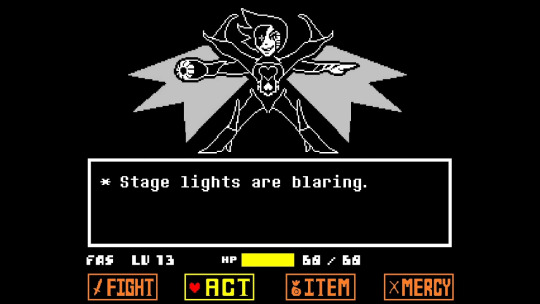
To start things off and make sure we have a reference, we need to list off the eerie yet superficial similarities between Mettaton and Asriel:
They both have multiple forms, with Mettaton having his normal form at the beginning, his EX form during his fight, and his NEO form in the No Mercy run. Asriel has his flower form throughout most of the game, his child form at the end of the True Pacifist run, and his “God of Hyperdeath” form also at the end of the True Pacifist run.
This is a minor detail, but they both possess the power to change the application’s name, with Mettaton turning it to “Undertale The Musical” during the track Oh! One True Love and Flowey turning it into “Floweytale” during his boss fight at the end of a neutral run. With the ability to change meta elements like this being traditionally associated with possessing determination in fan theories, we can conclude that there’s a case of overlap here. Another minor detail is that they’re the only two characters who can audibly speak, with Flowey’s creepy “that’s a wonderful idea!” and Mettaton’s famous “oh yes!”
One big similarity is that they’re both products of Alphys, with Mettaton being an attempt to purposefully enfuse a monster soul into an inanimate robot initially with the purpose of being efficient at killing humans, while Flowey was an incident caused by injecting determination into an inanimate object that had the remnants of a monster soul within it.
This is a bit of a stretch, but both characters are artificially inserted into your journey in an attempt to please an ulterior motive, with Flowey enacting his agency at the level equivalent of a player to toy with the same experiences and reconnect with whom he believes to be Chara while Mettaton was conscripted by Alphys to set up an elaborate stage play where she can rescue from him to feel better about herself, acting only at the level of agency as a monster.
The biggest emotional similarity is that both possess a mournful attitude towards a lost sibling, with Asriel on an endless quest of ironic spite against Chara for severing their old friendship by dying while Mettaton leaves Napstablook behind to pursue hedonistic dreams of fame and beauty, destroying the potential they had as a performance duo. Both rectify the holes these relationships left in them, with Asriel destroying the very thing that led to Chara’s death and Mettaton humbling himself reconnecting with Napstablook.
Goal-wise, they both obsess over humans but for very different reasons: Asriel has an obsession with only one human, and the reasons for this are very deep-seated and personal. Mettaton’s obsession however is more vain and is concerned with growing his audience beyond the borders of the Underground and being seen as a sort of vanguard for monsterkind among humanity. Or more insidiously, he feels as if he can assimilate into them. Both seek a form of transcendence that comes with obtaining a human soul: Asriel, as Flowey, seeks one so he can restore a bit of what he lost when he became a flower. Mettaton wants one again for vain reasons; those being to deprive Asgore of the opportunity and claim the title of the “Savior of the Underground” to himself.
Despite this being the most superficial similarity, it’s likely the most important: Both of their ‘ultimate’ forms—Mettaton NEO and God of Hyperdeath—have some interesting similarities between their designs. The most obvious is that they have these large wings jutting out, with Asriel’s having intricate color patterns while Mettaton’s flash between a brighter and darker shade of grey. Other similarities include excessively large shoulder blades and heart patterns on the chest area that are also shared with Undyne the Undying, indicating that this design motif is a trend among all major bosses considered to possess determination. Finally, this form also vaguely resembles the Delta Rune symbol, which I will elaborate on what they mean later. Despite all of this, it’s mainly the wings that are the contentious point of comparison, which I’ll get into later.
Lastly, they both seek a form of integration outside of themselves, with Asriel seeking once again the fusion of their soul with Chara’s, while Mettaton seeks total unification of their soul with their new body, and this is represented in the designs of their ultimate forms, with Mettaton’s ensignia featuring two hearts (one empty and one a monster soul) opposing each other, while Asriel’s features an empty soul within another empty soul. This is likely a metaphor that, despite all of the power he possesses, he’s still empty because he doesn’t have his friend with him. Conversely, this can apply to how Mettaton, despite achieving everything he basically dreamed of (as written in his diaries), feels empty because he abandoned Napstablook.
We’re finally done with comparisons to lay down the evidence for the main point. Now, we’ll get onto the Deltarune prophecy and what it means:
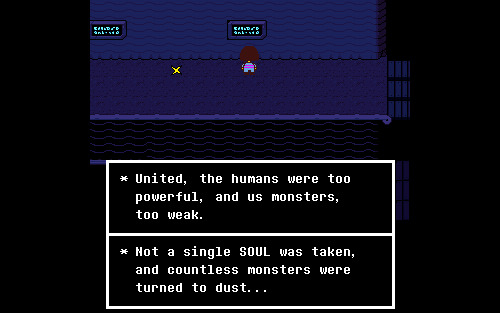
As most of you probably know, the Delta Rune is an emblem that represents the Kingdom of Monsters and is seen on the garments of every Boss Monster. In Waterfall, there are glyphs that describe a prophecy: “The Angel… The One Who Has Seen The Surface… They will return. And the underground will go empty.” If you ask Gerson to elaborate on what this means, he says that some monsters believe that this refers to a bleaker outlook: That the angel prophesied is actually a harbinger of death, and that this freedom actually refers to death.
If you connect the dots, you end up with two conflictingly obvious solutions: The first is that the player is the prophesied angel who appropriately fits both outlooks, being able to destroy the barrier and free monsterkind or free them mortally by attempting to slaughter all of them. However, another conclusion that can be drawn is that the angel prophesied is actually Asriel, and that you’re merely a vessel for his unwitting divine plan. While both are valid interpretations, the second is far more relevant to my point.
Also mentioned in those glyphs is the fact that not a single human soul was taken in the war between humans and monsters, alongside this is the missed opportunity to uncover that one can achieve godhood if they combine a human and monster’s souls. This implies a type of dualism as to whether or not the angel symbolizes the player or Asriel, as it’s more accurate to say that both the player and Asriel—the fusion of their souls—is the angel. This makes sense in both the contexts of the True Pacifist and No Mercy runs (and technically neutral), as both are attempts by Asriel to integrate with Chara again, with the former favoring Asriel’s determination while the latter favoring the player’s.
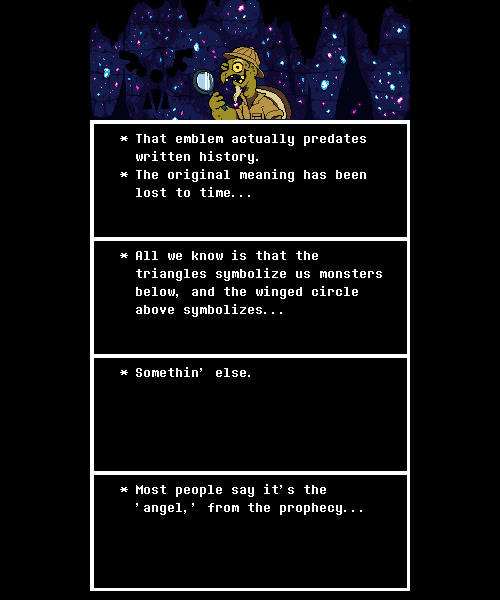
Now, what if I told you that Mettaton’s character in the story is his attempt to fulfill this prophecy artificially, thus making a false prophet of himself?
It seems hard to believe at first, but considering all the weird similarities between the staging and capabilities of both Asriel and Mettaton, it seems to imply that there’s some similarities between them in the context of the fate of monsterkind. Not only is it common knowledge among all monsters to speak of the prophecy, we also know Mettaton grew up in Waterfall alongside Napstablook and Shyren, meaning that this prophecy could’ve had more meaning to him specifically.
Now, it’s unknown whether or not the intentions to save monsterkind came about because of his hubris or because they were suggested to him by some higher command like Asgore, but considering that he states directly that he wants to kill you to prevent Asgore from taking your soul, it implies that Mettaton’s attempt at fulfilling the Delta Rune prophecy is entirely selfish.
One point of evidence in the camp that Mettaton was intentionally made to fulfill the Delta Rune prophecy is that Mettaton was made to impress Asgore according to Catty and Bratty. If this is true, then his position as a celebrity implies that he was made to be a beacon of hope that could be predictably grown and made to accomplish a purpose that fulfilled everyone’s collective desire. But the hair covering his right eye and its further concealment in his NEO form tells that, if he was created to fulfill the prophecy, then he wasn’t finished for this task and still required further tinkering from Alphys.
It may be entirely coincidental that Mettaton’s motivations as a character parallel and complement Asriel’s, but I find that hard to believe especially given the similarities of being separated from a lost sibling, seeking an integration of souls that’ll grant extraordinary power to embrace humanity to a degree, and possessing soulless objects. What I think really drives it home for me is the similarities between Mettaton NEO and the God of Hyperdeath, both of which are depicted as being angelic with prominent wings, which I’ll go on record to state are the only two boss fights in the game that feature wings prominently.
If Asriel is fulfilled as the angel of death, then the depiction of Mettaton NEO is given a newfound authenticity as he serves as the image of a guardian angel meant to stop you in a place where there is nobody to onlook, forcing him to act in authentic spirit. He now has the duty of protecting both monsterkind and humankind from you, even if he utterly fails at it.
One thing that’s hard to answer is how Mettaton is able to perform actions that imply metatextual awareness of the game and other similar actions Flowey does despite never being implied or hinted at possessing determination. Does this imply that, like Flowey, the process of integrating monster souls into inanimate objects grants them some form of determination? If so, it would grant greater proof as to why Mettaton has such a vested interest in fulfilling the Delta Rune prophecy beyond merely hearing about it. Yet, we know from the True Lab logs that Flowey was injected with determination while there’s no such implication that the same was done with Mettaton. However, we can gather from Napstablook being able to avoid being absorbed into Flowey as he transforms into Asriel that ghosts, as a type of monster, are seemingly immune to things other monsters aren’t. Perhaps this implies that they have metatextual powers like monsters with determination?
Now, here comes the really fun (and fortunately last) part where I draw parallels between these characters and the real-world mythology that may have inspired them:
Now, it’s a factoid among some that Asriel’s name may be inspired by Azrael, who is described as the angel of death in Judaism and Islam, and as part of that title, he separated souls from their bodies. His appearance has been described as being cosmically large, having an insurmountable amount of wings, and possessing a body formed of an amount of eyes and tongues representing every human being. Right away, we can see parallels to the God of Hyperdeath, who also has very large wings that appear to project a cosmic pattern within them. While its appearance may not correspond literally, he is a being composed of every human and monster soul in the Underground, eerily matching the description. Not to mention that Asriel absorbed Chara’s soul into them, equivalent to Azrael’s job of severing souls from their bodies.
Another factoid is that Metaton’s name is possibly inspired by Metatron, another angel of Judaism that, unlike Azrael, isn’t found in the Tanakh but is mentioned briefly in the Talmud. He has a similar job to Azrael in that he records the sins and merits of men, similar to how Azrael was able to see which names were blessed or damned. However, Metatron holds an even more lofty title in Kabbalistic mysticism as God’s mediator between men, being described as one “whose name is like that of his master”, even going as far as to be called “the lesser YHWH.” This is obviously a heretical dualistic proclivity in an otherwise monotheistic Judaism. Further, Metatron is related to Enoch, being described in Jewish apocrypha as the name Metatron used to have before he was transformed into an angel. Now, for all of that backstory, it parallels to Mettaton specifically in transformation: It seems as if Mettaton’s obsession with human reciprocation and the very humanoid appearance of his EX form imply that he wants to integrate into humanity similar to how Enoch entered angeldom.
The hot topic is whether or not Metatron’s power compared to that of God given the texts stating he was a secondary power in heaven with YHWH, but the answer most Rabbinistic scholars give is that he obviously wasn’t despite that it was written that all other angels bowed before him. However, this idea of there being dual power in Heaven is what later laid the groundwork for understanding the nature of Christ in Christianity. But in most Jewish sects, this doesn’t fly and is seen as a dualistic heresy, implying that there’s a falseness to Metatron’s power. Just like how there is a falseness to Mettaton’s power and intentions in all runs of the game. Another neat thing to note is that, as part of accepting Metatron as a real angel, one believes that any time a human believes God has directly spoken to them, it’s actually Metatron acting as his vessel. Perhaps this is parallel with how Mettaton is the voice of the Underground and it’s desire to be free despite himself possessing relatively lacking power?
The angel required a fusion of both a monster and human soul, and while Mettaton is the fusion between a monster soul and a soulless object akin to Flowey, it wasn’t enough to fulfill the role of the angel, falling short of his lofty dreams of being a savior. However, this disillusionment isn’t cruel, especially when you spare Mettaton and he receives a call from Napstablook (implied) that reminds him of his importance to monsterkind, making him reconsider his lofty ambitions to appeal to humanity. This is telling Mettaton that he is not a mediator between monster and humankind that he thought of himself as, for he never had the ability to combine both human and monster soul like Asriel. Perhaps he had the determination to be able to foresee the realization of the prophecy but not enough to put it into effect?
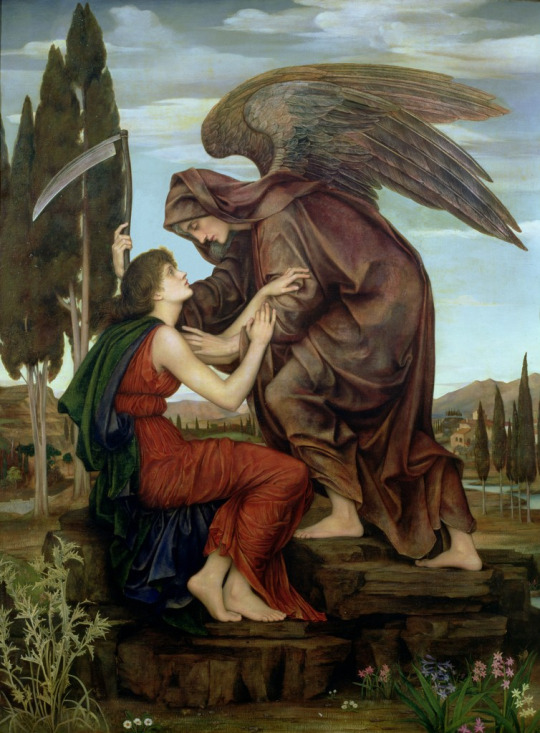
That’s just about everything I have to potentially support this theory, including referents to Jewish mythology. I firmly believe that Mettaton’s presence in the story was to serve as a false prophet to fulfill the prophecy of the Delta Rune, and that explains why his character and origin is so similar to that of Flowey.
51 notes
·
View notes
Text
Assassins, First Loves, and Blondes

(via Pinterest - credits to unknown)
Last night I watched the cult classic: Fallen Angels (1995) directed by Wong Kar-wai. The film was originally imagined as part of Chungking Express (1994) but grew into its own body of work.
Fallen angels is less of a film and more of a collection of photographs highlighting nineties Hong Kong at night. Throughout the movie we experience varying filters (resembling that of disposable cameras), quick cuts, and odd angles as if taken by someone relatively inexperienced.
The characters flit around in typical nineties’ fashion with a mixture of grunge and sleek looks. The film easily encapsulates the era with notable amounts of slip dresses, leather, quintessential nineties hairstyles and a cigarette in every character’s hand.
Plot wise the film is broken into three stories from three main characters’ perspectives: Wong Chi-Ming, his partner in crime, and He Zhiwu. I liked this storytelling choice, because it allowed us to follow the individual characters through their hazy nights. The film has little dialogue, what we know about the characters we piece together through their actions and their personal narrations. We never even learn the name of the main female lead.
To me there is no real overarching plot to the movie. The threads that connect each characters stories are feelings: love, loneliness, abandonment. The main characters cross each others path during the film, sometimes barely acknowledging each other. Ultimately making this film feel more like a dreamy peek into the lives of young loners.
There are many aspects of this film that could be dissected. However, I would like to focus on my personal interpretation of Blondie’s characters and the parallels she displays with He Zhiwu.

We are first introduced to “Blondie” in an empty McDonalds. She gleefully joins our favorite assassin Wong Chi-Ming for a midnight snack, even though he has no recognition of her. Blondie is an eccentric character. She’s erratic and unpredictable. If she isn’t at her standard state of child-like happiness her emotions are all-consuming. In my mind I picture her swaying, as if teetering on the line between real and fiction.
Blondie has one of my favorite wardrobes. Including this blouse, pin-striped cigarette pants, wedge combo that I found myself surprisingly into.

I find that her styling over all was a lot more subdued, and less “sexy” than the female lead (who’s styling I ADORE by the way). Still her short blond hair, red lipstick, and child-like aura reminds me a bit of Marilyn Monroe. This is interesting given that Blondie’s character embodies the “other woman.”
After their first meeting Blondie and Wong Chi-Ming return to her apartment a begin a no-strings-attached sexual relationship. She is then positioned as default as a “love rival” to Wong Chi-Ming’s business partner. Before they sleep together she tells Wong Chi-Ming that they knew each other in the past and that she dyed her blonde so that she won’t be forgotten. However, when his business partner catches a whiff of his perfume on Blondie, Wong Chi-Ming and her meet. Although Wong Chi-Ming doesn’t return his partner’s affections he still symbolically chooses her in the end by leaving Blondie and going on to complete his final assassination.
Blondie is distraught as he tells her he isn’t going to return to her apartment. Her worst fears are being realized. Despite her fun flirty attitude, and her unforgettable blonde hair, she was being discarded.
The name Blondie is used to reference another love rival in the film as well, although this Blondie is never seen on screen. It can be deduced that Blondie on the whole is supposed to represent the other woman, always the side never the main. Doomed to be forgotten.
Parallels can be drawn between Blondie’s character and He Zhiwu.
He Zhiwu fell for Charlie, a girl pining over a man that has cheated on her with “Blondie.” As he falls in love with her his dark hair lightened to an ash blonde. However, Charlie did not share the same affections. She abandoned him. The next time he meets Charlie, she appears to have forgotten him.
All the characters in Wong Kar-wai’s Fallen Angels have an air of loneliness. This is seen most clearly in Blondie’s character as more than anything she wants to remembered by someone, she wants to be loved. A feeling that is evoked by this stunningly aesthetic piece.
24 notes
·
View notes
Text

Hello, everyone! Can you believe this is the third time I've started the recap for this chapter? Between a dying computer and a mass edit during my monthly state of, "Oh my god get rid of everything we can't let people know that we wRITE!" this project is cursed. This is the version though, I can feel it. Be positive!
Now, where were we? It's been some months (RIP) since I last posted, so I wouldn't be surprised if everyone's forgotten what's going on in this insane novel. A quick recap before the recap then: new teams have formed, no one is happy about it, Sun and Velvet went off to a shady club run by The Crown and — shock shock, surprise surprise — got themselves into a heap of trouble. That's the long and the short of it. We have to wait a while to find out what happens to them though because this chapter is focused on Coco.
We learn that Professor Rumpole has sent Coco and her new team — Team ROSC — out into the desert to take care of the grimm around the city's borders. To say that Coco is disappointed in this assignment is an understatement. We learn that they've been at this for a week straight and have gone without showering or a change of clothes that entire time (no one packed a bag?), so for a second I was hugely sympathetic. You know this vine?
youtube
I feel this vine in my soul. Give me hot water and hot coco or give me death. Besides, work is work and dangerous, physical work without a break or basic comforts is incredibly taxing. Toss in the extreme heat of a desert and I'd be pissed at everything too, no matter how important my work was. That's human.
Yet instead of humanizing Coco like this, it turns out she doesn't care at all about the hardship involved. It's fighting grimm that she's annoyed by. She thinks that "Searching for the person or persons kidnapping innocent people for some unknown but dark purpose was way more useful than fighting Grimm far from the city" and I'm just like, Coco, honey...
Do you know what your career path is?
IT'S TO KILL GRIMM.
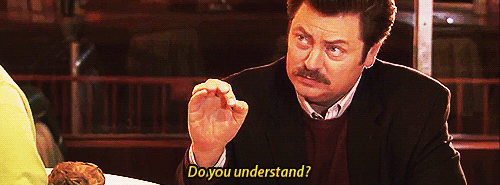
Okay, there's admittedly a justification here, but it's a stupid one. Coco goes on to say that "This area was called the Wastelands for a reason." She's snarky about it, saying that it wastes “her time, her talent, and her patience," but the real takeaway is that it's, you know, a wasteland. Deserted of grimm and of people. What's the point of defending an area that doesn't need defending? A huntress' job might normally be to fight grimm, but when those grimm aren't around and kidnappers are, that's a whole new set of priorities.
The problem with all this is that the Wastelands is definitely not deserted and it's definitely not as far from the city as Coco would like to imply. In just a few paragraphs an alarm is going to trip and Coco will find six grimm roaming in a pack. Then she finds a person. Then that person says she needs to get back to see someone in the city within half an hour. So there are grimm, there are people about, and this area is apparently close enough to the border that you can get back to the city proper, on foot, and then get wherever it is you’re going in a bustling metropolis... all within half an hour. By that logic these grimm aren't out in the boonies, they're right outside everyone's door.
Yet Coco isn't convinced, saying that "Post Beacon [killing grimm] had been for a noble cause, but this just felt like … busywork." I cannot possibly emphasize enough that this is the job she signed up for. Not to be a detective specializing in missing people, not a war hero always on the front lines of a battle, but one of many huntsmen who perform the daily, routine, very necessary task of protecting the people from grimm. With "protecting" covering both immediate threats and preparatory work that ensures more threats don't come about — like taking care of grimm outside before they become a larger threat. You know what would have happened if Beacon had a daily chore of students killing grimm within a few miles radius of the school? There would have been far less grimm charging a mass of unprotected students when negativity unexpectedly skyrocketed.
And, as always, I am aware that Rumpole is the likely villain here. From a writing perspective, this is very much presented as her getting Coco out of the way so that she can go about her nefarious deeds in peace... but that doesn't erase the fact that the task itself is a sound one. Rumpole's motivations don't matter here, only Coco's annoyance that she... has to do her job?

I mean yeah, everyone complains about their job to one extent or another, but can you imagine if you stumbled across a firefighter complaining about all the kitchen fires they've had to put out lately? "It's so boring! There are much better things I could be spending my time and talent on. I mean, that inferno that took out a city block last year? Putting that out was noble. But routine fires? House fires? Giving lectures on how to prevent fires in the future? Ugh, I can't believe the department expects me to do this grunt work." Meanwhile, you're sneaking off, hoping that this firefighter is never called to your house, nursing mild worries about how much they're romanticizing the recent tragedy that took so many lives...
Complaints about the job turn into complaints about the teams, which makes far more sense for Coco's character. Anyone's, really. Despite my insistence that it's a good thing they're learning to fight with people other than their three besties, that was absolutely a sudden and rather traumatizing change, just given how attached the teams already are. I'm not at all surprised that Coco is struggling to cope.
She says she misses her friends, obviously, but also "surprisingly, Coco missed being in charge."
...That's supposed to be surprising? Coco, you love being in charge! How is this in any way a revelation?
Apparently it is though, stemming from how bad Reese is as their leader. As with so many things in RWBY, I find myself disagreeing with a perspective that's presented as a fact: "She liked to lead by group vote, which wasn’t leading at all." Yes... it is? We could go down a rabbit hole of literal definitions — to lead is to direct, to direct is to regulate, to regulate is to direct again — but ultimately our understanding of a word does not adhere to the dictionary alone. It's a knowledge built on experience and I would hope that everyone's experience with the term "leader" includes that person considering multiple perspectives before making a decision. A leader doesn't impose their view on a group without due consideration of their preferences and needs — that's a dictator — a leader guides the group based on feedback and their personal knowledge. If that feedback and knowledge results in a standstill, or if their knowledge outweighs preferences, they are the deciding vote because the people have previously said, "We trust your decisions" through the act of making them leader in the first place.
Asking for a group vote isn't avoiding leadership, it's an act of leadership. Reese decided that these situations warranted a majority rule. She further decided that whatever they settled on was indeed an appropriate course of action. Leadership skills are required to assess a situation and determine whether it's appropriate to vote on in the first place. If I announce to a group that we're voting on whether we go to the movies or the museum, I've done the work to determine that both of these choices are of roughly equal value and roughly equal availability. I haven't hit on any snags like, "The only movies playing are mindless blockbusters and I want this to be an educational outing" or "The museum is too far away. We'll never make it to dinner on time." Figuring out that a group can vote is its own kind of work. This avenue is particularly useful when the group is of roughly equal standing. With a few exceptions (like Ruby and Jaune) huntsmen classmates are all the same age, underwent the same training, and have had the same combat experiences. This isn't a case of one elite huntsmen lending their knowledge to an otherwise green party, it's a school randomly pointing at a somewhat outgoing individual during orientation and saying, "You. You're leader material, I guess, even though you've done little differently than the person standing beside you." Someone has to lead and Vacuo's switcheroo proves that anyone can be the leader if they're just put in that position. Coco claims a group vote is just "passing the responsibility off to your team" and yes! You want to share the responsibility because you are a team. They are a group of four equals working together with one person to guide them, they are not a boss with three subordinates. Why wouldn't Reese utilize the skills and ideas of those teammates? When making a decision, why wouldn't she see if everyone believes it's a good idea to do Thing A as opposed to Thing B? Unless Reese is outright ignoring her own ideas, beliefs, or gut feelings to cater to the others — which there's no reference of — this is good leadership. She's assisting her team in making decisions as a whole, rather than arbitrarily imposing her view on three others of similar skill and experience.
Yet Coco acts like because Reese doesn't go, "We're doing Thing A! End of discussion!" it's not leadership. Which, frankly, says a lot about how the RWBY-verse sees leadership as a whole.

I realize I'm rambling a great deal, so let me quickly provide a different media example. I'm currently immersed in Star Trek: Voyager and in season two, episode 14 "Alliances," Captain Janeway is faced with a difficult choice: align herself with a violent and so far untrustworthy species, or risk traveling through this quadrant of space without any allies. At first she's entirely against the idea of an alliance, going so far as to say that this isn't a democracy. She's the captain, dammit, she makes the decisions! But her first officer begs her to reconsider. Then the crew express disappointment — even disgust — that she won't consider this alternative. Then her chief of security, being a Vulcan, provides a persuasively logical argument for why an alliance is worth the risk... Long story short, Janeway finds herself in the minority and changes her decision accordingly. She attempts to garner an alliance and the fact that she was right — the species wasn't trustworthy and the alliance fails — is entirely beside the point. She realized that the majority voice matters. As far as we know, Reese is already practicing what Janeway learned.

ANYWAY the point is none of it matters because these characterizations are a mess. Coco also throws out that Reese "dressed like she was a twelve-year-old hanging out at the mall" and supposedly acts like one too. We're not given any examples of what that behavior looks like and, sorry, but I'm not personally inclined to judge someone based on their fashion sense. It would be great if this story actually engaged with some of the flaws the characters demonstrated, rather than just throwing them out to exist in this unacknowledged void.
Not that Coco's fashion-focused personality is really that important. Truly, the best thing about all this is how contradictory Coco's own thoughts are. She also listens to her teammates... except when she doesn't. She know when to go with their ideas and when to dismiss them for her own... except when she gets it totally wrong. As with so much in RWBY, this doesn't feel like the author giving Coco deliberate flaws that the story will grapple with down the line, it just comes across as a nonsense philosophy about leadership we're not meant to examine too closely. Coco gets to make references to the fact that her own, supposedly superior leadership is filled with holes, but heaven forbid she engage with that.
She ends all this with the thought that no matter what she might decide, she trusted her team to "do what she demanded of them” and is now extending that courtesy to Reese. This I'm inclined to praise Coco for. No matter what she might be thinking, it doesn't appear as if she's tried to undermine Reese (well, not yet. More on that at the chapter’s end), and she doesn’t appear to be refusing to listen to that leadership, even if she doesn't like how it comes about. As we're about to see, Coco has her team's best interests at heart, no matter the challenges they're facing.
Her thoughts turn back to her old team and we get... this.
Velvet was with a team that didn’t recognize her awesome capabilities. Fox was withdrawing, having lost his family for the second time. Yatsuhashi was going mad with worry about Velvet and his teammates, knowing that he couldn’t be there to protect them, and worrying he would accidentally hurt someone on his new team.
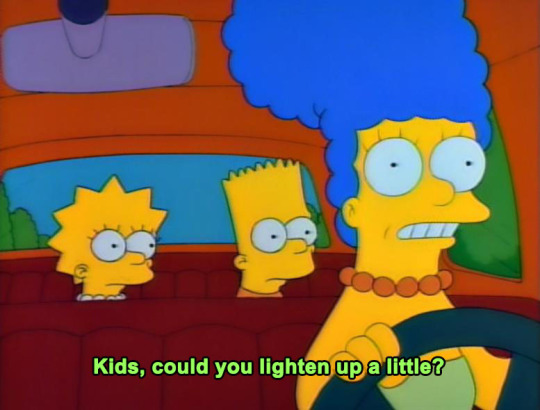
This is so unnecessarily dramatic. First, how does Coco even know any of this? Because it's been heavily implied that the old teams are barely in contact with one another. See: Velvet refusing to loop anyone in about the club and Coco stuck in the desert for a week. Second, why aren't they in contact, at least those who aren't on away missions? The entire group is acting as if changing teams means they're no longer allowed to be friends — family, as Coco puts it — when the relationship between Team RWBY and Team JNPR creates the opposite expectation right at the start of the series. Clearly, people from different teams can be close. Yatsu's worry that he might stumble using his semblance with new people is the only conflict that holds up here. Everything else has fairly straightforward solutions. Velvet needs to prove herself to new people. Yatsu needs to text Velvet if he's that worried about her. And Fox "having lost his family for a second time" is a pretty ridiculous exaggeration. You're attending the same school! Your family is still living down the hall if Vacuo has dorms like Beacon! In what world are these students unable to interact largely as they did before? They're acting as if the school has outright barred them from hanging out, rather than doing what will no doubt occur the moment they graduate: force them to work with different people. Just catch up with Fox over dinner!
Honestly, this chapter is pretty short, I'm just continually bewildered by this story.
To get back to the actual plot, something trips a sensor the group has set up and Coco responds to the situation in what I think is both a smart and empathetic manner. Previous experience has taught her that it's likely just a lizard, so she doesn't want to wake up her team for no reason. Disagreements aside, she cares enough to let them rest — "They’d probably appreciate the extra sleep." However, if it's a "rare case of something she couldn’t handle alone" she'd immediately call for help. Great plan! It's not often in this novel that I feel like I enjoy the characters, but this little moment actually had me liking Coco. Which, yes, I realize is a complicated claim. Characters should test the reader to a certain degree, mirroring all the personalities we see in real life, including biased, mean, or contradictory people. It's often a good thing to write a character that your reader is frustrated with. That can be the point! The problem with Myers' writing is that it isn't the point. Coco, as the former leader of our heroes in this tale, should be someone we enjoy spending time with and her flaws should be the basis for growth, or an acknowledgement that she is an imperfect, but well-rounded person. As it stands, flaws in this novel just sort of... exist? They bop around in the RWBY universe with almost no acknowledgement from the narrative or other characters, leaving the reader with little to nothing to take away from the text. Is Coco correct in her judgement? Is this a bias she needs to work on? Is she putting on a facade and her natural instinct to care for her team is the real Coco hidden underneath? Who knows! She’s just frustrating to read about most of the time and nothing comes of that.
Regardless, she heads out into the desert, using the night vision glasses Velvet made her.
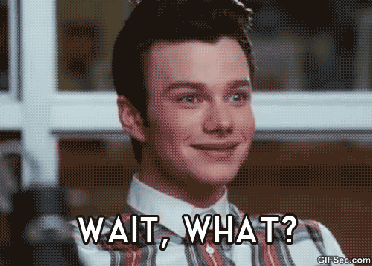
Now see, this would have been the perfect thing to introduce before Velvet was fixing relay towers after the expert was injured. Remember how I said the novel didn't do enough to establish Velvet's own expertise? Not that a pair of goggles is really comparable to fixing a communications issue, but it still would have gone some way towards convincing me that Velvet is this super impressive tech gal, capable of handling any and all situations that might come her way.
But no, we get this impressive display of skill after Velvet's knowledge was needed in a pinch.
The glasses help Coco navigate the terrain, allowing her to both see in the dark and zoom in on things in the distance. This allows her to spot the six jackalopes that tripped the sensor, as well as the woman currently fighting them: Carmine, a villain from After the Fall that I know nothing about. Ah well. Note though what I said at the start, that Coco's dismissal of this assignment is based entirely in its supposed uselessness. Yet now here we have a pack of dangerous grimm and an enemy to content with.
Also, this is where Coco moves from kindly teammate to overconfident fool. She said she'd call for backup if she needed it... and she clearly needs it! From what I can gather, all of Team CFVY lost to Carmine last time they met up. But now she wants to risk fighting Carmine alone? Go get the others!
She doesn't, of course. Carmine doesn't notice Coco at first. She's talking about how she has to get back into the city. "He’s going to kill me if I’m not back to the Mirage in thirty."
As said, this also implies that Coco isn't nearly as far out as she initially suggested. If Carmine can feasibly finish this fight, cross the desert, navigate who knows how much of the city, and meet up with the mysterious "he" all in under half an hour, then Coco is patrolling pretty much right at the walls. AKA, the area that absolutely needs to be grimm free.
Luckily for those of us who are reading the books out of order, Myers gives a quick recap of Carmine's significance. Last book she had kidnapped Gus and "held off the combined might of Team CFVY in the desert” (oh hey, I was right), presumably escaping afterwards. Now here she is again, likely up to some new, nefarious deed.
Our of curiosity, I googled to see what she looks like and...
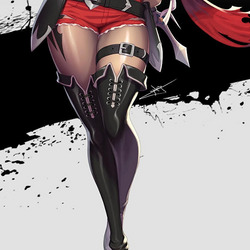
WHAT IS THAT OUTFIT?
Coco watches as she works to keep on top of the six grimm, debating whether she should help or walk away, but when Carmine is taken unawares, Coco acts without thinking, throwing herself into the fray.
Sometimes decisions were like that—your body already knew what to do while your brain was still processing the situation. Only in this case, Coco’s body wasn’t necessarily the clearest judge of character. Her brain would have said that Carmine didn’t deserve her help.
Now see, this is a scene I can get behind. The entire RWBY-verse is based around a type of superheroism: people with unnatural abilities, fantasy weapons, and extensive training devote themselves to protecting the people from various threats. Yet too often RWBY fails to convince me that these people are actually heroic, taking the standard flaws of a character and unknowingly exacerbating them to the point where I think, "Is this meant to be a commentary on the anti-hero? Or a critical look at these fantasy formulas? Because we've got the elements of that here, but no indication that the authors realize they're writing something other than that standard story." But this? This works for me. Coco, as a huntress, is so conditioned to help others that her body responds instinctively to someone being in danger, regardless of who that someone is. She outright admits that if she'd had the chance to think about it she would have decided against helping Carmine. The fact that she recognizes this and move anyway says a lot of good about her. Well done, Coco!

We see later that Carmine probably didn't need the help, but between the two of them the grimm really don't stand a chance. What's interesting though is how chummy the two are while defending themselves. Coco comments on Carmine's tendency to talk to grimm (like she does) and Carmine freely offers information about her movements, the fact that she lost her other sword, and that her partner, Bertilak, needs to "recharge a little" before getting back in the game. Carmine asks Coco if she'd like to team up with her instead (she does not) and the two have a number of flirty exchanges to top things off:
“I’ve been dreaming of a rematch with you,” Coco said.
“You’ve been dreaming about me? I’m flattered.” Carmine winked.
***
“Hot date with the Crown?” Coco asked.
“Don’t be jealous, darling.”
I bring all this up not as a criticism of the buddy-enemy dynamic (it's a favorite of mine), but simply because of something that happens next. Before we get to that though, I admit that I am on the fence about the flirting. Given that I haven't read After the Fall (assuming this characterization exists there), I know that Coco is a lesbian mostly via RWBY cultural osmosis, rather than through the text. This is one of the few (the only?) times that I've gotten a hint at her sexuality, yet it's associated with predatory behavior. Carmine, her enemy, is the one who turns an angry dream into a flattering one, the hot date with the bad guy into something to be jealous of. I'm honestly struggling to remember what, if anything, Coco has had to say about women in this book — this is what comes of such slow recapping and I acknowledge that this is entirely my fault — but I'm nevertheless discomforted by knowing Coco's canonical status, knowing RWBY's struggles with queer rep, and then reading a scene where the most overt representation thus far is the bad guy twisting Coco's words into something sexual.
I'm no purist. Give me a good enemies-to-lovers fic any day of the week, but that doesn't mean that kind of dynamic is the best to pull from in a franchise already facing heavy criticism for its queer rep.
Especially since the moment the grimm are gone Carmine turns her sai on Coco.
This is the "something that happens next" that I referenced above. It's weird to have them attacking one another after a whole scene of pretty genuine companionship. Coco doesn't help Carmine as a consequence of defending herself, she willingly gets involved. They tease one another. Carmine appears to answer her questions honestly. There's both implied and overt references to how well they work as a team. Then, suddenly, Carmine is outright trying to kill Coco, not just with her sai but by burying her alive. It's not the sort of banter that Ruby and Roman used to engage in, trading fake compliments and, in Roman's case before his death, legitimate feelings while attacking one another. Nor is Coco prepared for an attack the moment the grimm are gone, and she's not surprised by it. It’s just this sudden change that feels rather jarring.
Though it's far from the first time BTD has failed to convey the emotion of a scene. Here's another example rnow. As said, Carmine is attempting to bury Coco alive by moving the sand with her semblance. That's horrifying enough on its own, but remember that Coco is claustrophobic. Yet none of that panic shines through here. She comes across as indifferent throughout the attack, thinking back to summers when her brother tried to bury her while she sunbathed, amazed that she could ever consider this fun. You know who Coco sounds like in this scene?

At no point during this attack did I get the sense that Coco believes she’s in serious danger, let alone that she's struggling against a long-term phobia. The only time I even remembered that claustrophobia is meant to be a challenge for her is when she throws out the oh-so casual line, "One of her worst nightmares was being buried alive." Oh really? Because it doesn't seem like it! Coco is calm enough to remember that she used to be able to hold her breath for exactly three minutes and forty-two seconds. That doesn't feel like a character fighting against her worst nightmare.
So this scene isn't exactly compelling. Which is too bad because, as said, Coco as some other nice moments in this chapter.
However, during all this we do learn a little more about Carmine. Prior to getting trapped in the sand, Coco comments on how shockingly strong she is. "Carmine should have been at least a little bit worn down from fighting Grimm," but she's not, "She seemed nearly unstoppable now." Coco hits her full in the face, but she doesn't seem fazed. Earlier in the chapter there was that comment about how she previously took on Team CFVY alone and at the end of the battle Coco observes that Carmine "still seemed as fresh as she had at the beginning of the fight. How was she even doing that?" My basic reading comprehension skills tell me that this is setup for something, likely some change enacted by the Crown. Surely the text wouldn't put so much emphasis on Carmine's strength — have Coco questioning it to this extent, framing it as unnatural — unless we were going to get an answer, right?
But this is RWBY, so I'm not inclined to count my chickens before they hatch.
The rest of Coco's team arrives and it's then that she decides to pull the super dangerous stunt to free herself. Yeah, yeah, I get that she's suffocating and needs to do something now, can't wait to be dug out I suppose, but the timing is pretty ridiculous. The cavalry has arrived, yay! Time to blow myself up.
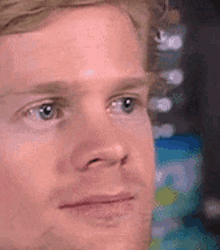
Seriously. She blows herself up. Using her own semblance, Coco focuses on one of her gravity dust bullets and detonates it, causing all the others in her arsenal to detonate too. It gets her out of the hole and "knocked her Aura down to a dangerously low level."
So... let’s see. Coco can literally detonate a bunch of explosives on her person, after suffocating under stand, after fighting Carmine, after fighting grimm, after a week long mission, and her aura doesn't break... but Yang's does from a single Neo slash?
Okay, RWBY.
Reese and Olive try to attack Carmine together, but end up eliminating one another's attacks. I like that a team actually has some realistic difficulties for once. Coco, however, is internally an asshole, calling them "idiots" and saying that they need to learn to coordinate their attacks. Thing is, she apparently hasn't done anything over the last week to help with that. She's been too busy complaining about Reese's clothes.
Carmine runs off as more grimm show up, drawn by Coco's non-existent panic. To her credit she does thank the others for saving her... but then immediately tries to downplay that. “It wasn’t a fair fight,” Coco spat when Reese (correctly) points out that she's the one who was ambushed. She also starts giving orders and when Reese (again, correctly!) goes to point out that she's the leader, Coco talks over her, saying they can't waste any more time out here because she has reason to believe that Shade has been compromised. She needs them only because she's out of bullets and low on aura, but they definitely need her because "let’s face it, I’m the best strategist around for miles."
Coco's a strategist?
And why does she sound like a villain trying to convince the heroes to work with her? She’s already part of the team!
Putting all that aside for the moment, we're back to this prideful characterization. I liked the well-rounded Coco from a few pages ago who balanced caring for her team with the likelihood of needing backup. Now she's flinching from the idea that she'd ever need help (hello, Sun characterization too) and snatching Reese's role the moment she's given the chance. So much for respecting her position. If the book wants me to believe that Reese is unfit to be leader and this is a golden opportunity for Coco to right a wrong... how about we actually show Reese being a bad leader?
Regardless, yay working together? The chapter ends with them presumably taking out the grimm before heading back to Shade, along with an important revelation. Prior to leaving, Carmine asked Coco why Yatsuhashi and Fox weren't rushing to her aid. It's only now that Coco realizes she didn't mention Velvet. Why? Perhaps because Carmine already knows where Velvet is, which obviously doesn't imply anything good.
And that's the end of Chapter Ten! Can you tell I never know how to finish these recaps? Describing cliffhangers doesn't have quite the same punch as, you know, actual cliffhangers. You all just have to suffer through my mediocre endings with me.
But would you look at that! Turns out the third attempt at writing this was the charm! :D
See you for Chapter Eleven! 💜
30 notes
·
View notes
Text
Genshin OC: Louis
Based on Interactions with @genshin-obsessed
And Pocket, in the original it was Signora who traumatized him sexually(I'm sorry if it offends you but I feel uncomfortable saying the r word), but I don't think she's that evil so in this fic it will be slightly different, but still as messed up.
_____________________
Louis is an inventor from Fontaine, perhaps the brightest in all Teyvat. After unknown circumstances he was forced to flee Fontaine to Liyue, where unfortunate circumstances lead to him to meet Kazuha. Kazuha rescued him in his moment ot need, and inside of taking the life debt Louis offered the samurai merely took his friendship. Now he works as the fleets greatest engineer, repairing and upgrading the ships of the fleet with never before seen technology.
But one has to wonder, what ever caused him to leave Fontaine? And under what city did he meet Kazuha?
__________________
Physical description: a fifty year old man in the following outfit
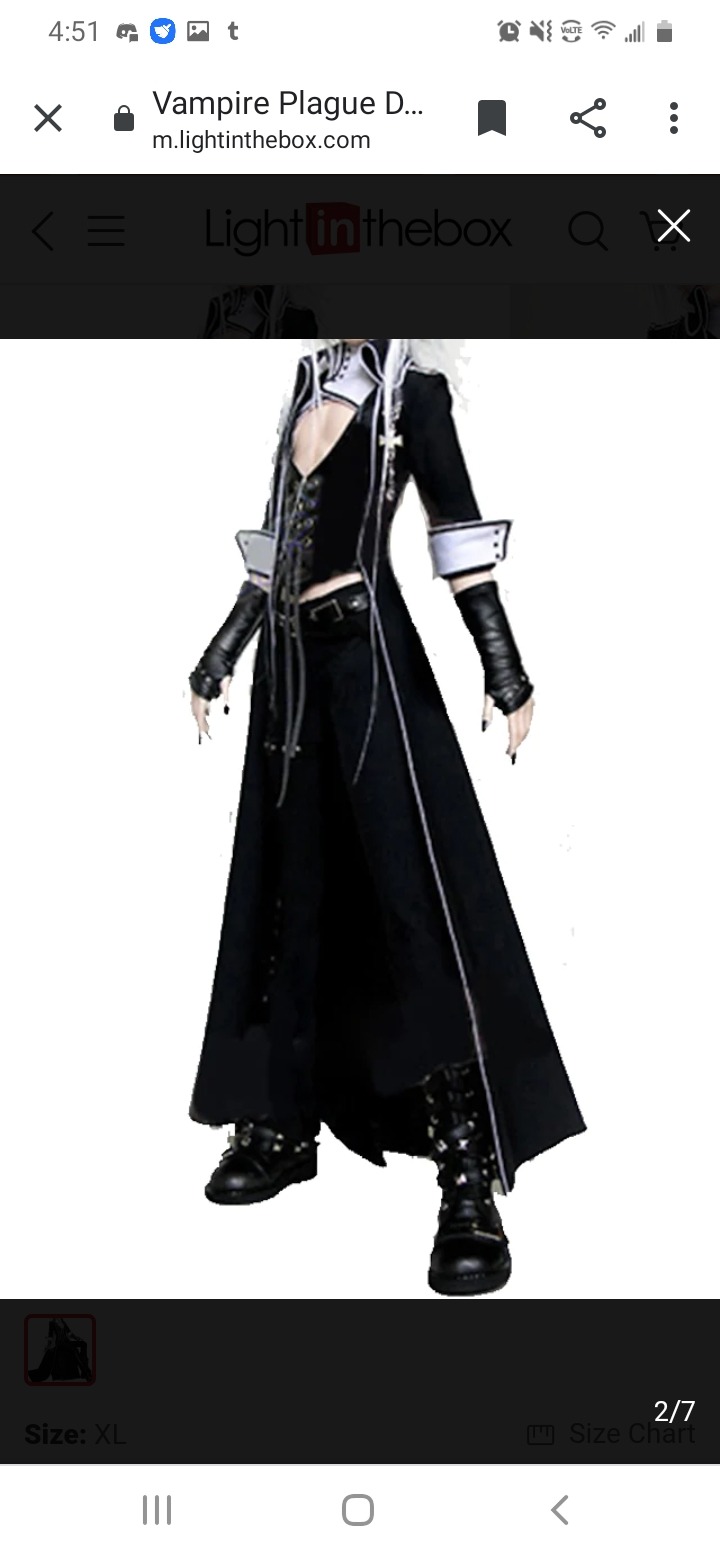
In this hat

Both his arms are burnt all the way to his shoulder, so he hides them with finned gloves
(Also: I consider Kazuha to be an adult, so if you know about the shipping plan with the Interaction thing with Pocket it's not weird)
He has teal eyes, long silver hair, and a twirling pencil thin mustache.
_____________________
The rise
Louis created his first groundbreaking invention at the mere age of six: a torch that ran on gas!
When he presented his invention it was met with grand....disdain.
People called it a scam, that what he said was impossible. He was laughed and ridiculed, to the point he disappeared from the public eye for many years.
Until fifteen years later.
At nineteen he skyrocketed into the market of invention, using something noone could dispute nor deny the grandeur of: he created a gun!
_____________________
To forge an empire
It was not easy to make it in the invention markets of Fontaine, even with patents one could not stop competitors from making their own form of their products.
So Louis had to be the best damn inventor of all of them! It was why he got his vision, his ambition, his soul demanded it!
And so he did. He hit every corner of the market with high quality inventions every week, from gas ovens to full plate armor, from fans that spun themselves to moving walls! It was once said in Fontaine that if someone wanted the very mountains to move at the push if a button, all they needed to do was pay Louis to make it.
Hundreds took their children to him to for apprenticeship, master craftsmen begged to work for the genius half their sons' age and twice their own skill. It wasn't long before his inventions were being sold by merchants all across Teyvat.
_____________________
A defiled heart of glass
As happy and successful as Louis was, there was something he longed for, something no amount of ambition, success, nor money could ever get him: someone who truly cared for him.
He had believed this to be true for years, until one evening ball,
He met a woman.
She approached him as he sat surrounded, yet completley alone. She walked up to him and said, "you look lonely, would you like to go somewhere else?"
She said it without any ulterior motive, no sucking up, just a genuine want to hang out with HIM. No as Louis the inventor, but as Louis the man who enjoyed inventing.
They walked away from the party, saying to abyss with any who found it rude! And went around the town as two friends, absolutely enamored by eachother's hopes and dreams.
They were friends for five years when Louis finally confessed his love for her, how she would listen to him, and care about him, something he gave to her in equal share.
But a mere year into their relationships he found out his lover's secret: she was Fatui.
One night he found her coming home through the window, in her complete uniform no less. She was afraid, afraid he would leave her for what she was. But instead, all Louis did was wipe her tears and day, "how can I help?"
Do began his secret dealings with the Fatui. He used his bright mind to create countless machines of war for them to use, guns that did not need loading, gas powered suits of armor that gave strength well beyond that of a human, anything thr Tsarista wanted she would get. Because whatever the Tsarista wanted, his love wanted.
His darling love, Signora.
Or so he believed.
Ten years into the deal he was discovered by the Fontaine government and quickly proclaimed a terrorist. He had to flee Fontaine, so he went to where Signora was at the time, Liyue.
When he met her in Liyue he fully intended to propose to her, but when he got on one knee to do so, all he recieved was a sharp freeze through his chest.
And his glass heart shattered, on the stone cold ruins of an empire.
_____________________
Meeting the samurai(tw: this is where the bulk of the messed up happens)
A quick death, however, was not to be his end.
Signora hated him, despised him, for the time she "wasted on this useless, lovesick freak" as she put it.
So she let her mages do to him as they pleased, and left.
And they took full advantage.
They tortured him, violated him, broke him in every way they pleased.
They even convinced him that it was his fault, that he should enjoy what their doing, that he should thank them.
Then left him for dead.
For days he sat slumped on a stone pillar, riddled with holes, barely holding on to life.
'But why?' He had wondered. For he had believed their lies, that he deserved this fate, 'this is a fitting end.' He believed, a fallen emperor, dying on the long dead corpse of an equally grand empire to his own.
'So why?' he wondered, 'why do I keep fighting?'
Then one day a wandering samurai found him and took him in. Louis begged the man to let him die, "I deserve this. She said so...I deserve this....why else would she have done it?"
But the samurai did not falter, he carried the man to the nearest settlement to be healed.
When asked why, the samurai responded, "if you weren't so hurt, I would throw you on the wall and shout you down! WHAT IN THE ABYSS MAKES YOU THINK YOU CAN JUST GIVE UP!? BECAUSE SOMEONE SAID SO? BECAUSE SOMEONE GOT UPSET WITH YOU? SO WHAT!?" The samurai grabbed Louis' vision and held it to his face, "YOU HAVE A VISION, A GIFT FROM THE GODS, GIVEN BECAUSE YOU HAVE A DREAM! THERE IS SOMETHING YOU WANT ISN'T THERE? DO YOU KNOW HOW MANY PEOPLE WANT THIS? WHO WOULD BEG TO HAVE THE ABILITY TO FULFILL THEIR DREAMS?!" the samurai began crying, "do you know how many have had that stripped away? All because someone said they should? Well they still fought. They all fought. And so many died." He placed Louis' vision back on its holder, "so don't you dare give up, and don't you dare die just because someone said you should!"
It wasn't the help Louis needed to fix himself, but it was enough. Enough to help him go on.
_____________________
Vision: shards of a broken dream
Despite what he told the public, Louis did not spend those fifteen missing years because he was discouraged, but because he was betrayed.
Louis was approached by a well known inventor, who said he would help Louis' invention get the recognition it deserved!
Louis should have listened more carefully, because the man never said anything about helping HIM get the recognition he deserved.
The man stole his patent for the gas lamp and rebranded it as his own invention, and threw Louis to the curb.
Were Louis any other person he would have curled up in the warmest alleyway he could find and die, but Louis was not any other person.
Instead he began to create, he spent years and years trying to perfect gas power, then the gods saw his ambition and granted him a vision, a vision of flame.
The vision ignited at an inopportune moment however, and caused a massive explosion that nearly killed the then twelve year old boy.
Inopportune to anyone else, that is.
For in the flames of pain he saw the truth, the overwhelming power that is explosive force.
Then with his still burning hot hands he got to work, forged casing after casing to try and capture the gas that had shown him the light. He spent weeks forging a small metal pellet that could not only survive the blast, but also remain strong enough to pierce through nearly any armor. Then he created the keystone of his work, his masterpiece, the first gun.
And he used the first bullet to take revenge.
_____________________
Abilities:
Main- power of gas: throws a glass container with flammable gas, applying a swirl like effect to a large area that effects all enemies.
After using it, the player can use the ability again to strike a piece of flint that will create a giant explosion that only effects enemies.
Ultimate- culmination of ambition: Louis creates a large explosion blasting enemies away, the camera then zooms in on him holding up two pistols. After the animation ends Louis replaces his Catalyst with dual guns that deal 5X damage and attack twice as fast for ten seconds
Weapon type: Catalyst
Vision: pyro
Passive: glass heart- party members gain 5% extra friendship experience when Louis is in the party.
Special dish: ice cold jelly- a simple spin on the classic mint jelly, Louis adds a special cooling agent to it that increases the cold of the mint exponentially.
(Tagging: @storytravelled, @golden-wingseos, @genshin-obsessed)
18 notes
·
View notes
Text
What Entrapdak Means to Me
On the eve of Entrapdak Positivity Month, I thought it was as good a time as any to share my rambling thoughts on a ship that’s affected me in a way I didn’t think was possible.
Entrapdak is the first ship I have ever been invested in. It’s such a new experience for me that it’s taken me the last few months to wrap my head around the whole thing. I may relate to the characters in a show, but when they form romantic attachments I view it with a degree of passive distance. I don’t understand what it’s like to have those sorts of feelings for someone (I am aromantic and ace as a brick), and, well, I’m honestly not curious enough to give the subject a thorough study. My mind tends to fixate on other things.
What does this have to do with Entrapdak, you ask? Long story short for people who don’t want to read my meandering essay -- I relate a lot to these characters, and the way they bonded together struck a deep chord in me that I can’t ignore.
Let’s start with the characters. I knew going in that Entrapta was neurodivergent-coded, but I took it with a grain of salt. When I actually watched the show, however, I found myself relating to her so deeply it shocked me. Never have I felt such a kinship with a fictional character! We don’t share every trait, but it was still like seeing my brain put to life on screen. I related to her enthusiasm over her special interests, her struggles to fit in, her desire to make friends who accept and understand her for who she is.
The fact Entrapta is completely herself is something I love about her. Over the years of growing up undiagnosed, I developed a lot of masking strategies. Human psychology is one of my special interests, and even with all that accumulated knowledge, masking isn’t easy. It’s extremely mentally taxing. Masking can certainly look easy -- I can, when I have the drive and energy, “pass” as neurotypical, and only people who know me extremely well can tell I’m dying inside. All that effort is taken for granted by a lot of NTs because that’s how people are “supposed to” act, and surely I can “do the bare minimum.” The accumulated stress of near constant masking has led me to the darkest moments I’ve had in my life.
Entrapta’s struggle with leaving Beast Island hit me hard. It threw me back to a time when my feelings of isolation and worthlessness got so bad that I lost the energy to do anything, even the creative pursuits that were the obsession of my life. I retreated so deeply into my inner world that I hardly interacted with anyone. That total apathy shocked my family into getting me professional help, which gave me my autism diagnosis, the coping skills to move forward, and a good start on the road to self-acceptance. It also opened a channel between my family and I, allowing me to feel heard and understood. (An important side note on mental health: if you or someone you love needs professional help, please seek it! Sometimes you have to try out several therapists -- it took me three to find a good fit -- but you are worth it!)
It took me longer to realize, but I also relate to Hordak in some ways. Mercifully I was not raised in an extremist cult environment. However, I know what it’s like to feel defective next to a sibling that seems perfect. I was constantly being compared to my younger brother, and in all areas but art, he was superior. He was smart, athletic, and above all, he fit in with everyone. I didn’t hate him for this -- I hated myself. Trying to measure up to his standard is what caused me to develop such strong masking strategies. Underneath it all, I felt the despair of knowing my peers would reject me as soon as the mask cracked. I also live with chronic joint pain, starting at around age seven. The jury is still out on what’s causing that (the worst of it was due to a previously unknown food allergy, but the pain still comes and goes, even though it’s a lot more manageable than it used to be). This cocktail of pain, stress, and sensory issues I had to deal with gave me a very short fuse at times.
As an aside, just because I sympathize with Hordak does not mean I am excusing his actions. He is still going to have to face the consequences of his choices, and work to adjust to life post-Prime. The series end gave him a new beginning, the opportunity to be redeemed, and I prefer this to a rushed redemption arc.
What I love most about Hordak and Entrapta’s relationship is how they accept each other as they are. Hordak gives Entrapta near free reign of his sanctum, he listens to her when she talks, and he respects her opinions. Even when he pushes her away, he still considers the logic of what she tells him, and sometimes ends up doing things her way despite his initial instincts. This is something I do in my own life; I am easily overwhelmed by new information, so my initial response to an idea/activity is almost always a firm (and sometimes rude) “no,” until I have time to properly process and think about it. Hordak is the first person in Entrapta’s life that truly listens to her. He still has things he needs to work on, but it’s a lot better than how most of the princesses are with Entrapta. The Alliance treats her as someone to be managed -- she is useful, but unreliable. Hordak, in contrast, trusts her to get things done in her own way.
On the other side, Entrapta is the first person in Hordak’s life to accept him without judgment. Hordak spends so much of his energy putting up a front of strength and intimidation, and Entrapta cuts right through that. She’s not frightened by his appearance, and even his outbursts have little effect on her until the two of them start to bond. Entrapta doesn’t come into their interactions with any preconceived ideas of what Hordak is like, or more importantly, what he should be like. This lack of expectation leaves her completely open to accepting whatever Hordak does and says, and it also relieves Hordak of the burden of needing to put on a front around her. When Entrapta sees him at his most vulnerable, she reaches out to him with compassion, something he has never felt before. Entrapta also does this in a way that doesn’t belittle Hordak. His imperfections are not something to pity, they are a valuable part of who he is.
I loved watching their friendship develop. Entrapta and Hordak’s shared time together evolved slowly into a bond that gave each of them a sense of belonging they had never experienced before with anyone else. It gave me the hope that, despite what an oddball mess I am, perhaps I could find someone who understands me too.
When a romance subplot inserts itself into a story, I tend to gloss over and ignore it (if I pick up on it at all). I’m even less interested in sex. Way back when I was first getting into fandom I was so excited to go online and meet fellow fans of the books and shows I liked, only to discover the spaces being dominated by arguments over character pairings. I was baffled. This is what people are most interested in? Oh well… back to the hermit cave I go!
I was late to the party with SPoP. I’d watched a few episodes, but the show didn’t really hook me. This was partially because all I ever heard people talk about online was Catradora, and if that was the main appeal of the show, I wasn’t sure I would enjoy it (sorry Catradora shippers, romance is not going to entice me to watch a show, even if it’s rep). Quarantine was the ultimate cause for me embracing my curiosity and diving headfirst into SPoP, binging the entire thing a few months before the release of season 5.
I vaguely knew about Entrapdak as a ship going into the show, and I admit, had I not been primed for it, I probably would have missed the romantic potential entirely. In no way did I expect to become invested. I was immediately intrigued by their dynamic, and as they got closer, I found myself thinking “oh, I see why people ship these two.” I didn’t understand this realization until months later. I was relating to the characters, and for the first time in my life, I was relating to their relationship.
I headcanon Entrapta and Hordak as an asexual couple. I’ll elaborate on this at a later time (asexuality is a spectrum with a lot of nuance, and this post is plenty long already), but at the core of it, I find joy in imagining these characters in a loving platonic relationship, something I hope to find myself one day. I hope this love comes across in my artwork and in my fanfictions <3
To those of you that read this far, wow, you must be patient! Have an imaginary cookie! I hope this ramble has provided a decent picture for why I, as an aro ace on the autism spectrum, have come to cherish Hordak and Entrapta’s relationship. It’s my first and only OTP… I’m still in shock thinking about that… I guess we’ll see where things go from here!
Take care of yourselves out there!
#entrapdak#entrapta/hordak#entrapta#hordak#autistic entrapta#autistic experiences#relatable characters#fandom ramblings#spop#spop headcanons#asexual headcanon
173 notes
·
View notes
Text
VLD S8 – The Purpose of Lance’s Altean Markings, Allura’s Canonically Inconsistent “Death,” and Voltron’s Mysterious Interstellar Road Trip in the End: Are Things Really As They Seem?
Hello dear ones, I received asks to follow up on my previous post about Allura’s capability to live a very long life if she hadn’t died in s8. I’d mentioned in this post that Alfor had connected Allura’s life force to the indestructible Voltron, and that this had significant implications for Lance’s strange Altean marks and Allura’s “death” in s8. So this is me, attempting to follow up on those requests!
Let’s start with those strange marks. It seems like a lot of us who have watched Voltron: Legendary Defender season 8 scratched our heads over Lance receiving Altean marks at all:

This event happens when Allura and the paladins are standing in the “connected consciousness of all existence”—which is this…Mother-Brain realm for every consciousness that ever existed ever. Allura is preparing to sacrifice herself alongside Honerva, because they both have to give of their energy to regenerate the fallen multiverse. Honerva is already accepting of this and already interacting with her dead family whose minds and forms are preserved within the Mother-Brain space. It seems, even so, Honerva is still alive because she hasn’t yet completed the foretold Wild Sacrifice Move of Ultimate Alchemy alongside Allura:

The Big Boom of Life happens after this point, so there’s something fascinatingly screwy about this realm. The typical separations between the Living and the Death are just…totally meaningless. We’re actively seeing a living Honerva physically interact with the minds and forms of her fallen son and husband. And if this Mother-Brain location truly preserves the consciousness of all existence, then I suppose it actually makes sense to me that Allura and Honerva could still be alive themselves while also being able to interact with the Dead who are preserved within this realm…
But Allura—she turns to the paladins and tells them that they’re all about to experience a massive fragmentation from her. It seems pretty heavily suggested that she’s going to die. In doing so, she kisses Lance and then gives him Altean marks:

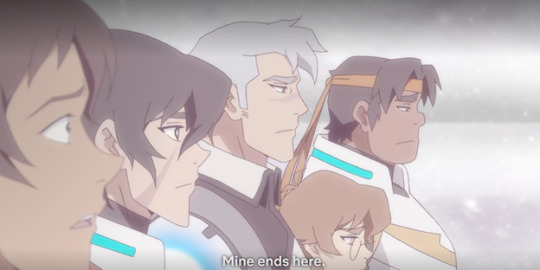
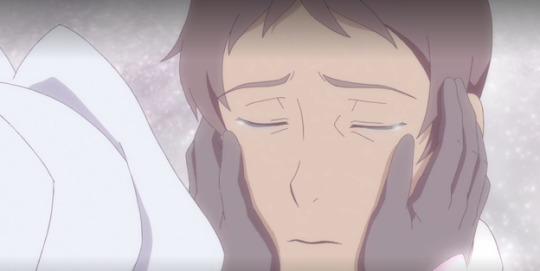
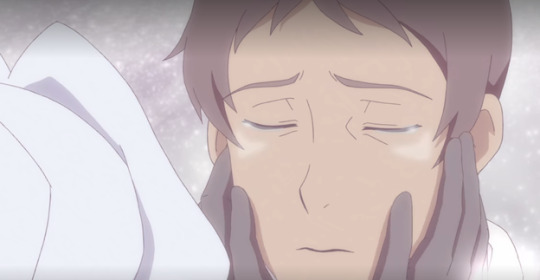

And the first question I have is….whyyyy the marks? What the heck was that for? Because I think it’s really weird that she’d just give Lance the most visually identifying mark for her own species. At least, I think it’s weird on the surface. The more important question may lie within Allura’s motives...and that gets into some much larger implications for ways to view those marks and the show’s ending. Some of the theories I’ve seen about those marks:
Theory 1: Lance as Trans-Species to Preserve Allura’s Species and/or Allura Giving Lance Some Unknown Gift/Power
I want to bring this up because it appears to be a largely accepted theory that I’m now heavily questioning. I’m not sure who first vocalized this understanding of canon, but Neko Chicana offers the theory in their Youtube video “Why did Lance get Altean markings!?” The theory is that in Allura’s last-minute panic about dying, she was trying to ensure The Chosen Altean vibes got passed down. This would mean that Allura infused Lance with deep Altean powers to inherently change him from being human into being a trans-species human/Altean.
But I struggle with this interpretation, because…she already had an entire colony of Alteans, many of whom clearly were presenting with high quintessence sensitivity and would have been even potentially fit for Oriande. And it’s not like Lance was going to know how to apply alchemy without learning it anyway.
In terms of the transformation itself, it’s incredibly superficial. It’s a face-lift and that’s it, as Lance never exhibits any other features of a standard Altean. And not just from a visual perspective, but also from a physiological one. He definitely is not shown suddenly freaking out over having alchemy powers. He isn’t shown connecting with anything on the astral plane. I would even posit that he appears to be aging right alongside his fellow humans, given his more adult/less baby-face facial structure in the epilogue, just like everyone else:
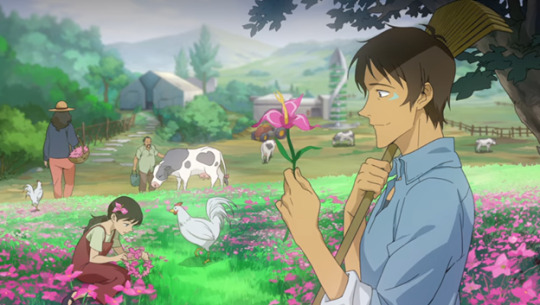
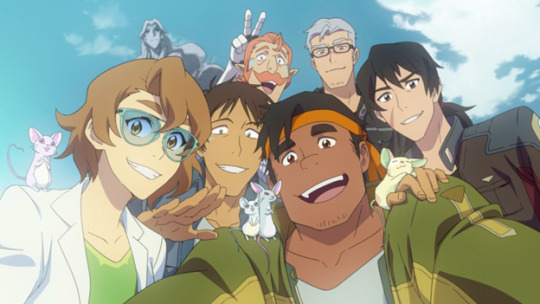
This article here seems to contain a similar level of skepticism about a genuinely trans-species Lance.
And what would even be the point of converting Lance to have a token visage of Alteans, if Allura knows that his true heart and soul lies with his human family? Just by Allura’s reaction of disgust to his rounded ears in season 1, it seems pretty obvious that other Alteans would see him as “other.” If anything, a trans-species interpretation overly complicates the show here and generally can’t provide a self-contained, meaningful reason for its existence at all.
Theory Two: The Markings as a Token of a Lost Lover/Remembrances
Another suggestion has been that Allura gives Lance such markings just as…a reminder? Of herself? But I don’t feel this at all makes sense with seven previous seasons of her character behavior.
Allura is shown consistently trying to sacrifice herself and her things at all costs, without anything in return or demanding that people remember her. She did it in season 1 to regenerate a Balmera, knowing full well she could die. But we don’t see her asking Coran to sing a pretty song for her. She sacrifices herself again for Shiro, by tossing him out of the way of Galran soldiers, without even begging that he come back for her. She sacrifices herself in Oriande to the White Lion. She sacrifices her crown in season 7 to stabilize Shiro. She even gives up her dresses and her station as a princess in order to better fit in with the humans in season 7. It’s not inherent in Allura’s character to demand anything in return for her sacrifices, much less that she be remembered for them. As a matter of fact, she’s very particular about ensuring that other people get recognized for their actions, and she’ll often place her own good work as part of a “whole” accomplished by the many. Here’s an example from season 6, episode 1:
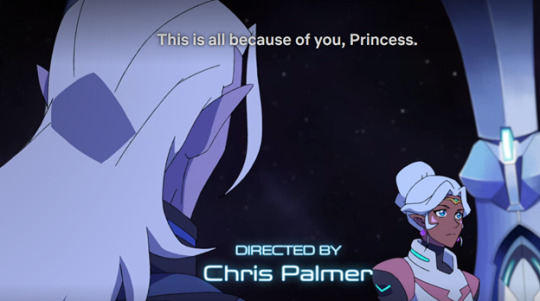
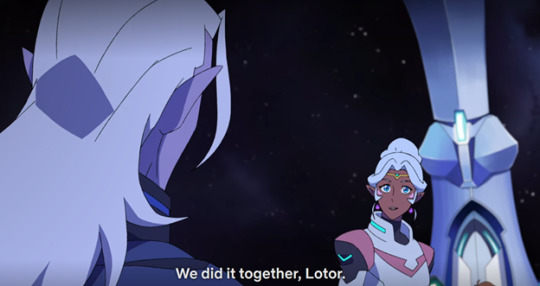

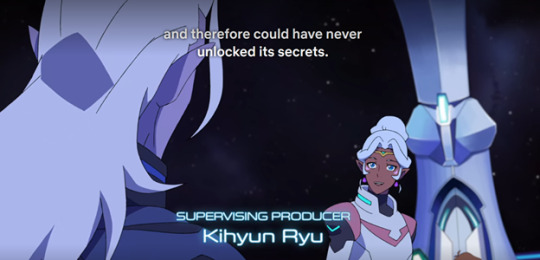
So here we see her raising up other people and their contributions rather than demanding some offering or worship for her actions.
Princess Allura doesn’t even hold a grudge for Keith being accepted as Black Paladin or Lance as Red Paladin in s3, despite the fact that she secretly cried over it.
So, Allura wanting anything in return for what she sacrifices, or trying to intentionally drag down someone’s spirit for her own comfort, is not inherent to her character. If anything in s8, Allura consistently seems to want the paladins to move on without her:


In response to the emotional distress of the other paladins, she doesn’t give them an everlasting token to memorialize herself, but instead gives encouragement for the future:
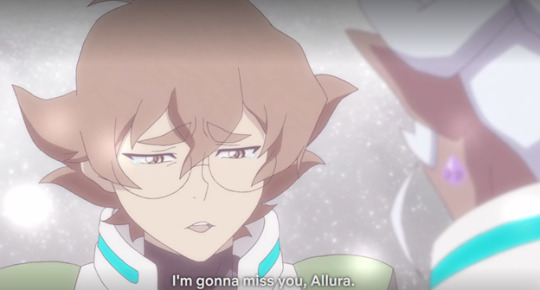
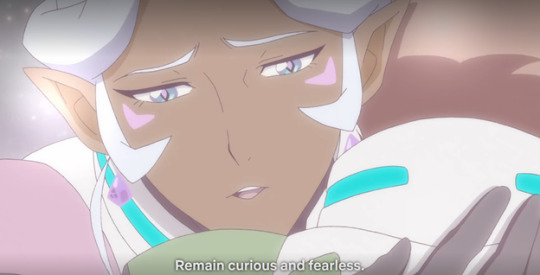
And even Shiro! He warns her that she’s about to become the multiverse’s most anonymous hero:
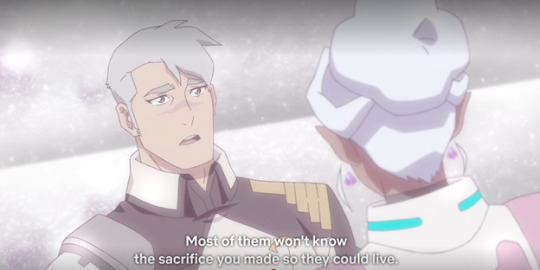
And Allura’s response to this?

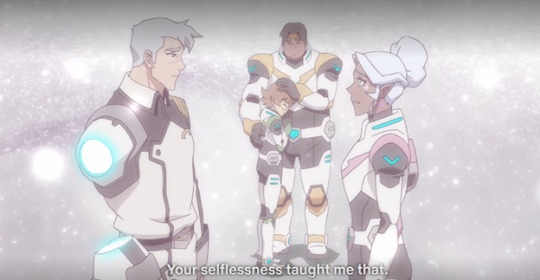
So Princess Allura went into this s8 self-sacrifice, fully expecting that the paladins would keep her actions totally secret. She was completely and utterly prepared to accept the very reality that Lotor had threatened her with in season 6:
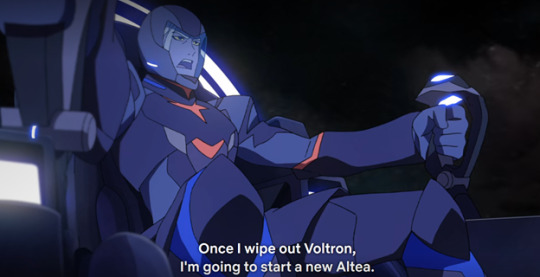

So literally the only reason in s8 that anyone remembers Princess Allura…is because the paladins choose to honor her memory despite her stated sentiments against it:
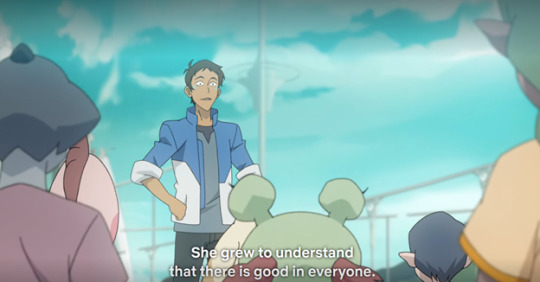
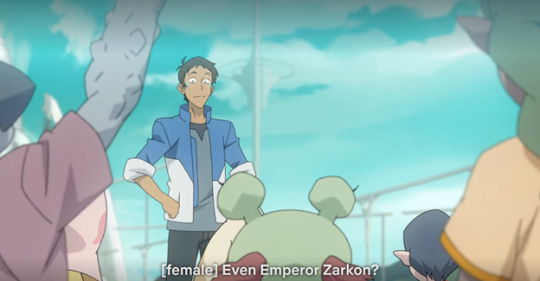
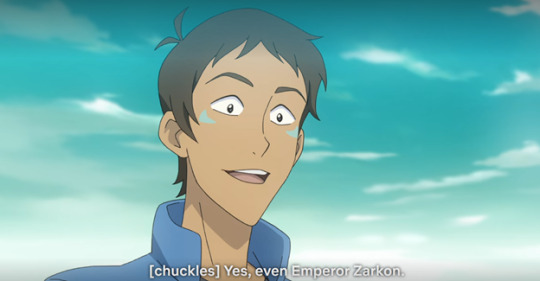
So…all of this is to say, I don’t think it makes sense to assume that suddenly, Allura would want to forever keep Lance from moving on. She’s literally handed them her blessing to move on, and suggested that they even hide what she’s done. It’s the paladins who choose to remember her. So I think there’s a lot of evidence to suggest against an interpretation where Allura was intentionally trying to mark Lance to be her forever-doomed lost love. It’s completely inconsistent with other surrounding details about who Allura is.
I think there’s instead evidence to suggest a new theory about these marks. And if anyone’s suggested this before, please feel free to jump in, lol. I’m like, 1.5 years behind the times here, although I did find this article that also would seem to support the theory:
Theory Three: Lance’s Altean Marks as a Tactical Homing/Location Beacon, Strengthened by His and Allura’s Shared Bonds With Blue Lion
Before she casually walks off to her alleged death, Allura tells Lance, “I’ll always be with you.” And then she gives him the Altean marks:
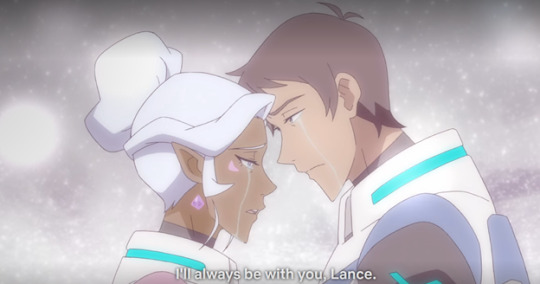
While I think this “I’ll always be with you” statement has some classic lessen the hurt of impending death vibes, Allura herself actually states she’ll always be with him. How certain are we that she’s not being actually serious? That this isn’t an intentional decision to ensure some kind of ongoing link?
So backing up here, we know from previous seasons that Altean markings can glow, unlike the rest of their body. They appear to glow in response to external stimuli. For example, in season 5, Allura and Lotor’s markings glow because they are within the vicinity of Oriande and have a deep well of quintessence within them. And this glowy activity is discriminatory, because Coran’s marks don’t glow:

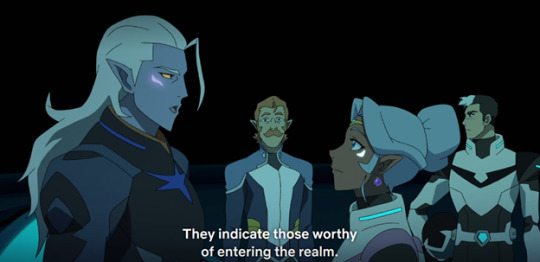
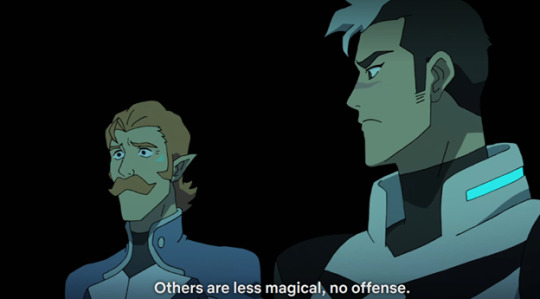
Lance’s own markings initially glow when activated by Allura:
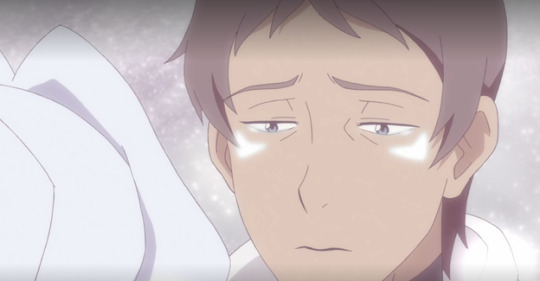

So for Lance’s markings to glow at all, that means something is happening. It means that an all-new, external stimulus is making those markings react, and that the magic of it is active. And that Lance is now housing enough magic to react.
That article I linked to earlier suggests that perhaps Allura intended to use the marks as….a communicative link with Lance. However, in a full year since Allura’s disappearance, we see no evidence that Lance has been talking to a mysterious spirit!Allura. He seems pretty depressed, and everyone seems largely accepting of the concept that Allura is dead and also is incapable of interaction.
In which case, if you did have a link to a supposedly dead person, even if you wanted to keep it secret, wouldn’t you at least look a little more…happy? That they’re not actually gone? So something’s a little screwy there too, that makes me think Lance wasn’t in some kind of interdimensional communication with Allura.
But I do think Lance’s markings, and how they glow in response to external power sources in the final episode, suggest something about Allura’s state of being.
So let’s jump in. We know that Allura’s life force is inherently tied to Voltron:

As I’ve mentioned in a previous post of mine: Right in season 1, episode 1, Coran admits that Alfor has done some pretty wild alchemy. He physically connected Allura’s essence with the essence of Voltron—the single source of self-regenerating, infinite quintessence throughout the whole of the entire universe.
I don’t know if a person’s life force being personally connected to Voltron would confer physical immortality, but I do think there’s a lot of evidence to suggest that as long as Voltron exists, Allura’s essence would be preserved within it. And as we saw in season 6, Shiro was capable of interacting with other paladins despite his physical death, because Black Lion had preserved his essence….
All of this backstory and worldbuilding means at the very least that Allura was also capable of linking some part of her quintessence to Lance as well. And that, even if she hypothetically didn’t have a body on the material plane, that she would be very active on the astral one.
So why specifically Altean marks, then?
This isn’t the first time in the show that strangely powerful bonds have been made by the touching of faces and the transfer of energy around Altean marks. As a matter of fact, we might have even seen Alfor actively bind Allura’s life-force with Voltron, right here:
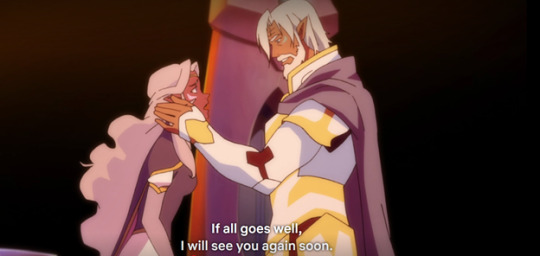


In which case, Allura was simply mimicking the work of her father as she knew it, but on a much smaller scale. Because she knew from her father that it was possible to bond life-forces, and for some reason, that alchemy trick appears to involve the face or else something to do with Altean markings.
So therefore, the activation of this marking “link” and alchemical bond might help to explain why Lance actually appears to be smiling with tears in his eyes when the Voltron lions fly away:

But why even Lance specifically?? What about all the other paladins she’s made connections? What makes Lance so totally special?
It might not be unintentional that, out of all the lions possible, the one to respond to some unknown activator one year later—with massive amounts of quintessence in the bond—is Blue Lion.


Notice that while the other lions are in flight, none of them are glowing like Blue Lion. There’s something inherently special about Blue Lion right now, especially given that it’s not even the leader of the pack.
In this scene, we see the paladins rushing out per all the ruckus. Lance’s markings start to glow:
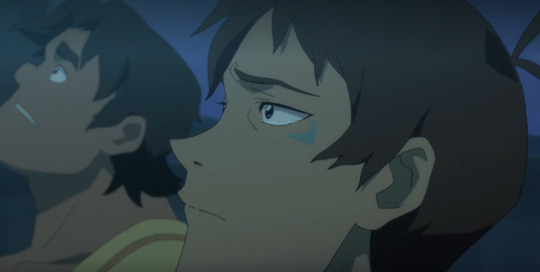

And then the lions powerfully surge off on their merry, totally unexplained way:

So…in looking back at this, it’s interesting that Lance’s marks are shown glowing in ONLY two instances: 1) When Allura first activates them, and 2) When the marks themselves mysterious activate again in response to Blue Lion glowing outrageously blue, and the lions soaring off into space as well…
Is it a mistake that Lance just so happens to be the only other living Blue Paladin in the universe?
Allura’s life force might have been connected to the full of Voltron, but season 3 shows that her communicative/mental connection to it is through Blue Lion alone. Because Black Lion certainly had nothing to say to her, at the very least.
So Allura’s life force is connected to Voltron…Blue Lion responds to an unknown source of massive, pure quintessence, and then Voltron follows…Lance’s markings start to glow....
Could it be that in order to even re-locate Voltron and the paladins again in the larger scheme of the multiverse, Allura needed Lance’s connection to Blue Lion as well? To keep Allura in spiritual/mental communion with Voltron and with that universe?
With Allura gone and the Atlas portion of Voltron totally missing from Voltron, there’s the hint that possibly the Lion Musical Chairs event has undone itself and reconfigured once more. Blue Lion has re-accepted Lance, with Keith and Shiro piloting Red and Black. The lineup in the screenshot below would suggest that Shiro’s the one in Red this time, resulting in an interesting addition to the Keith and Shiro relationship arc. It suggests that Shiro is now back on the team as an established paladin, as the right hand of the Black Paladin, and is actively supporting Keith’s ongoing growth as a leader:
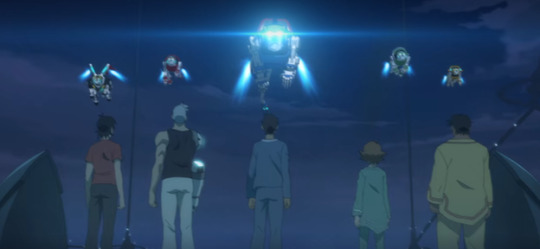
But if Blue Lion were Allura’s only true connection to “speak” with and interact with Voltron on a material plane, then it would make sense that she would intentionally connect her own life-force to the last Blue Paladin.
Lance, out of all of the paladins and with respect to this lineup shown here, is the only one who would be even remotely capable of ensuring this link in their universe (notwithstanding as well that canonically, Allura was in a romantic relationship with him, which might have something to do with this too, idk).
So what does this mean for Allura’s state of being? What’s exactly happening in this moment? Why do the lions leave their paladins? Is everything truly so pointless and nihilistic?
So Lance’s markings and the exit of the Voltron lions result in what I feel are two interpretations of the entire end of Voltron. And I think one is potentially more consistent with the overall show than the other:
Theory One: Allura Really Died/Shed Her Physical Body/Was Lost to the Material Plane After a Year of Hard Work
So, we do have evidence that the work to restore the full of the multiverse began pretty quickly, and that there was an explosive event to jumpstart it:
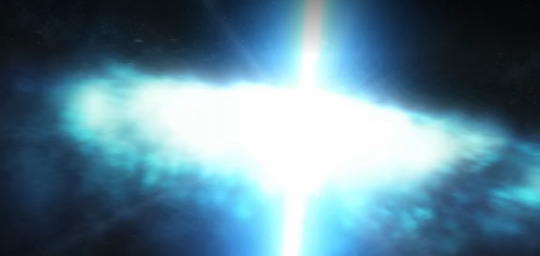
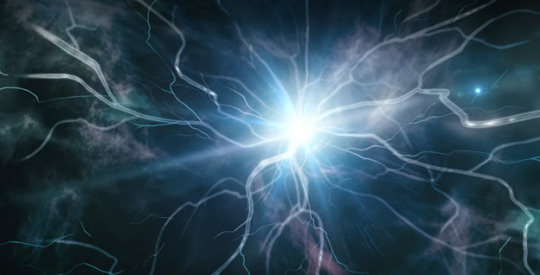
We otherwise have no evidence to support that this image meant the work (to restore every thread and all things within the threads) was DONE. Yet. It may have taken an entire year to regenerate the multiverse, which would explain the Voltron lions suddenly reacting strangely after that span of time. If we assume that Allura really died, then this would suggest that—with the overarching multiverses finally totally restored—her energy is spent up. She’s physically dying. And per the extinguishing of her own life force, Voltron….somehow can’t exist on the material plane without her? Because let’s not forget, the whole mecha is connected to her life force. So this interpretation would suggest that in her dying/being unable to remain on the material plane, Voltron itself has to die as well. This could explain why at the end here, they activate to go be with Allura and team in the shiny afterlife party in the Mother-Brain dimension. Lance may be crying here because he feels or recognizes the last of Allura’s energy slipping away. And it’s possible I was misinterpreting his smile earlier, because it’s, idk, maybe a sob.
And there does seem to be some canon support for a potentially permanent break between Allura and the material plane, as well as for why Voltron would leave:
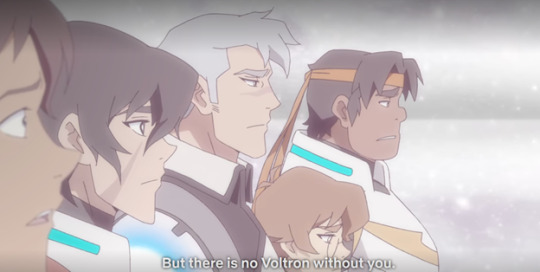

But I’m really struggling to understand the deathy interpretation of these events at the end of s8, from SEVERAL angles, haha.
Strike One:
This scene would appear to blatantly and outrageously contradict previous show worldbuilding. To accept a “death” interpretation, one must also accept that s8 completely rewrites the inherent properties and behavior of quintessence, as well as show details that Alteans/Altean technologies more consistently function as conduits/capacitors of external energy sources rather than as massive batteries by themselves. The true batteries, even into season 7 with Shiro and Atlas, appear to be becoming from sources external to the power-wielder. This reality largely relieves the personal cost of any alchemical action/draining oneself, just so long as you have a powerful enough battery. In which case, given the resources and deep knowledge available to Allura and Honerva even in this apocalyptic moment, any action resulting in physical death feels...unearned.
If you’re interested in more specifically about this, I have a few other posts looking at these basic worldbuilding details:
Question on Quintessence and General Worldbuilding in VLD S8
The Search for the “Bluest Quintessence” and S6 - The Most Unnecessary Conspiracy In VLD?
It’s entirely possible I could be missing some information that would reconcile the s8 worldbuilding contradictions about quintessence and Altean energy back to the previous seven seasons. I suppose it’s possible that this s8 regeneration trick resulted in Allura and Honerva being physically unable to handle the amount of power they were conducting. But just after casually re-watching the show, I heavily question whether this is possible or consistent with everything else, haha.
Strike Two:
The concept of Voltron not being needed in a peaceful universe is nonsensical. So this show is telling me that a gigantic mecha capable of massive construction projects and space anomaly protection services couldn’t reorganize its paladins or get new ones, and transition to a new day job? Because Voltron has to exist in a combat theater only? This is wildly myopic, especially considering that Voltron already has a team of five who could pilot it again via a little game of musical chairs…and even the final lineup shown would suggest that Shiro had already taken over Red. I guess if the Galra aren’t attacking?? This must mean that there won’t be any civilizations in need of help or in need of being protected from imminent natural disasters?? At the very least, a new day job would be an incredibly meaningful way to convert Voltron from a war machine to a champion of the people. And it would still give the paladins a reason to come back together as a team and to exercise the bonds they’ve forged together as defenders of the universe.
Strike Three:
After this s8 scene, and even assuming Allura has physically died, Voltron existed before Allura got linked to it. And it existed as a largely infinite and indestructible source of energy. Even if Allura did die, the loss of her personal quintessence was of no account to its existence. The worldbuilding of Voltron as a mecha suggests it didn’t need her to continue existing on the material plane like it had existed before their alchemical link from Alfor. And even if she’d died, taking Voltron’s life-force with her away from the material plane, then why in the world wouldn’t Voltron just…totally power down? Become completely inert with the lights fading from its eyes? But then, oh wait, according to the last seven seasons, Voltron is supposed to be indestructible and constantly self-regenerating even when temporarily drained, so how could it power down forever? Even the concept that Voltron could physically destroy/remove itself from the material world to fully join Allura on the astral plane is an oxymoron.
And even if Allura’s life force was fading out and the Voltron lions are dying too, how in the world could Lance’s Altean markings suddenly even manage to glow in response to an active and powerful external stimulus? And why would the lions themselves suddenly be lighting up and capable of expending massive amounts of energy on a sudden, random interstellar space trip?
Even if the Lions themselves longed to reunite with its dead creator or its missing piece per their Allurian life-force link (despite them clearly not caring when Alfor died or when Allura got put in stasis 10k years ago), this show would have me believe that Voltron wanted to die or give up? And...for what? To lounge about in an afterlife Cabana for Retired Mechas, sipping quintessence drinks while the universe experiences ongoing natural physical disasters or anomalies that could endanger entire galaxies? What if more trans-reality comets fell from the sky? They appear to not be an isolated incident, and where there’s one, there’s usually more…What if that causes more rifts to open? And let’s just assume for a moment that those two comets are the only two trans-reality comets in the multiverse. I guess we can all sleep tight tonight because Voltron is unconcerned that the universe still has several weak stitches between it and the quintessence field, where dark entities and rift creatures roam? Lol, what?
Lotor even confirms these weaknesses in season 4:

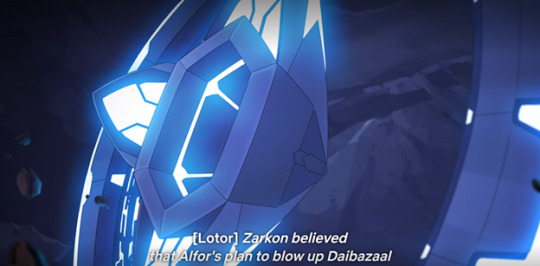

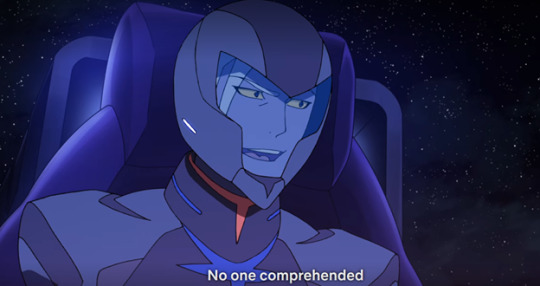

“Zarkon believed Alfor’s plan to blow up Daibazaal and destroy the rift between realities actually worked. No one comprehended that the experiments of my mother, Honerva, could never be undone.”
Lotor’s statement here would suggest that after everything that’s happened, it might be even easier to break open rifts. But okay cool, time for Voltron’s retirement/death, I guess. Just leave a peaceful universe to be one day swallowed up and destroyed by shadow rift creatures, dark entities, apocalyptic comets, and natural disasters…
Everything about the Allura/Voltron death theory doesn’t make sense to me and raises more questions than answers. So let’s look at another way of viewing this ending!
Theory Two: Allura Didn’t Die At All—She Just Finished Working for the Year And Needs a Ride Home
The fact that Voltron survives and is activated into movement by an external source of massive, pure quintessence suggests that Allura is likely NOT dead and is STILL ALIVE. In this case, the astronomical undertaking of regenerating a multiverse still took a full year to complete. We do know there’s no major time slippage between the paladin’s universe and the Universal Consciousness realm, because the paladins were seen right back in the heart of establishing/confirming peace when they returned to their universe. And again, s8 also shows people being able to interact on the border between the Living and the Dead, so Allura simply existing within this realm should not be enough to kill her. Because life and death are largely meaningless concepts in this space where all consciousnesses are preserved.
So, if Allura is alive and just finished her work, then oop, now she’s stuck in the middle of Space Nowhere without a certain ride home. So who ya gonna call? Ghostbusters. Voltron is the only ship that Allura has a deep psychical and life-force link to, so it would be within canonical bounds that if she just helped resurrect the multiverse, then surely one hard-working princess could use Lance’s markings (her own life force) to relocate her own universe, and then use that bond on the material plane to call Voltron from across the universe to come pick her up, lol.
I really like this re-interpretation of canon for several reasons:
One, it feels a lot more consistent with the world-building and the overall tone of the show.
Two, it suggests a much happier ending where canon confirms—sort of like the Iron Giant (1999) ending—that Allura would eventually reunite on the material plane with the paladins.
Three, it suggests that there’s been a full one-year span of time where Allura and Honerva were both working together to restore the universe…while in the presence of and even interacting with Alfor, Zarkon, and Lotor, and probably a billion other dead people they thought were gone forever, but who were preserved in form and mind within the Consciousness of the universe. I feel like there’s just LOADs of possible content someone could get out of this. Did Honerva and Zarkon reunite? Did Alfor get to hug his baby girl again? Did Allura and Lotor have a major heart-to-heart discussion about the Altean colony and his quintessence insanity, and positively reconcile? Which, regardless of however you interpret what Lotor’s accused of, Allura had already…exonerated his motives and turned him into, like, a Joan of Arc figure well before she saw him again. And she even wanted Honerva to honor his memory by doing the right thing:

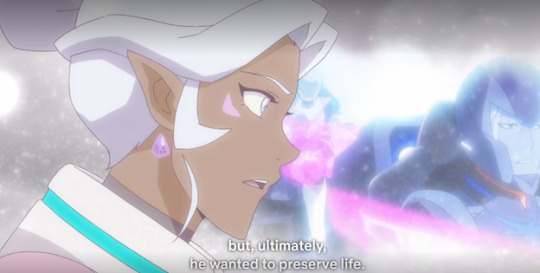
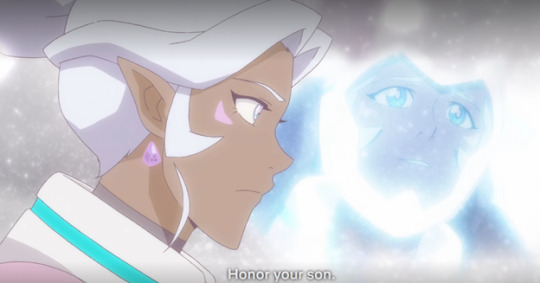
So there’s some clear signs that Allura and Lotor could have reconciled now that there’s no apparent quintessence insanity or witch shenanigans afoot... And it’s very likely that Allura might have even reconciled with the true, uncorrupted Emperor Zarkon himself:



And in the meantime, what would the paladins of old be like? Were there other victims of this war who would have found it meaningful to interact in some way to obtain justice for themselves…or to obtain something more??
And this gets into reason four of why I like this re-interpretation of the ending. So canonically, mechas created out of the trans-reality comet are infinitely regenerating and indestructible. So not just Voltron, but also the Honervian/Sincline mecha. This suggests that Allura already had a ride home.
So why would Allura need more ships?
This interpretation has the potential to reverse all the painful deaths that happened throughout the show. The original paladins, the Alteans and Galrans who perished for various reasons...Alfor, Bandor, Lotor, Kova…even deaths we didn’t see.
And in calling Voltron back to her, is Allura maybe…planning to bring some new friends with her too? If she already has the Honervian/Sincline mecha to fly home, why does she need all five lions, anyway? Who would pilot them? Who else is waiting patiently in the celestial mind/heart of the multiverse to return to reality with her?
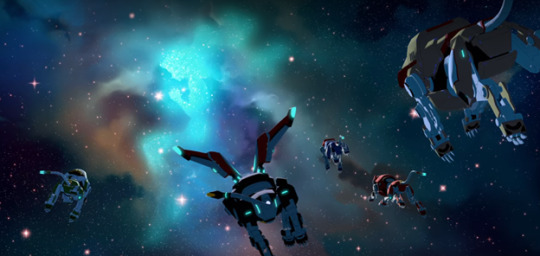
And reason five, on a simpler and maybe less galaxy-brain note, this interpretation provides a completely different context, however apparently sorrowful, for Allura’s canonical goodbyes:
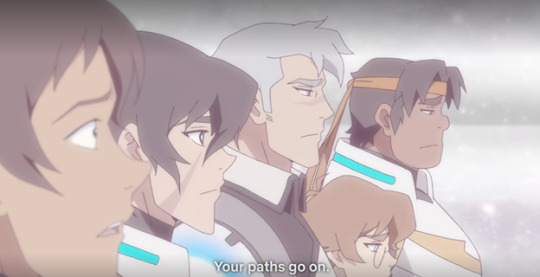
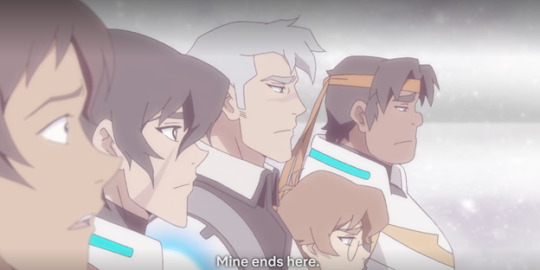
Allura’s path did end here...at least as a paladin of Voltron. Because that position was temporary anyway. Restoring the multiverse was going to be an ultimate act. And there’s probably nothing after this that Allura could perform to outdo herself in saving things, lol. This is the height of everything she is and has worked for. She intentionally identifies this as her purpose:
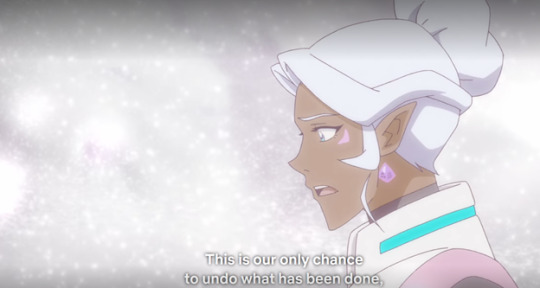
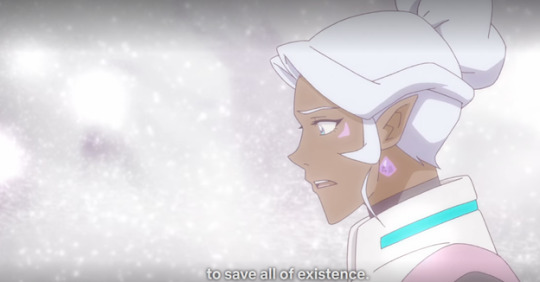


“It is my purpose.”
Her action in s8 is the full and total culmination of everything she has learned and grown capable of doing since s1. Everything has been leading up to this. It’s her one chance to undo all the universal pain. And through restoring the multiverse, she’d be restoring balance in her own life too—to reconnect with her fragmented past, to give those from her past a chance to live in the new universe with her….
The other paladins, though—they were still needed in the meantime to confirm peace with the Galran empire, to convert it (however questionably) to a democracy, and to establish relations between Earth and other vast galaxies of people. Allura was not wrong that their paths as paladins had not ended. Because she needed them to ensure their universe would be truly at peace while she was up in the stars, working to restore and reconcile with all that had been lost in painful war.
And all of this would ultimately suggest that she would return to the universe, to the paladins, and probably take back the piece of her life force she’d given Lance that ensured a link with Blue Lion. Because…that homing beacon wouldn’t be needed anymore. Perhaps Allura would even consider decoupling the remainder of her life-force from Voltron, to fully reconcile herself to herself. To finally be whole and just Allura again, idk.
The only major problem with the “Allura is Alive and Bringing Some Friends/Family Home” interpretation is that...lol, the development team for the show doesn’t subscribe to it, at least not in any outward way I’ve heard. Based on their March 28, 2019 interview with Let’s Voltron, the executive producers talk about Allura like she’s dead. They say that they wanted to show sacrifice, the impact of death, and how important it is to honor the memory of the dead:

And we definitely feel it. There is a massive weight of loss and memorial in the finale here. Coran looks just this side of totally broken as he remembers Allura, and he didn’t even get a chance to say goodbye. He reiterates just how much Allura means to the people still alive in this universe:
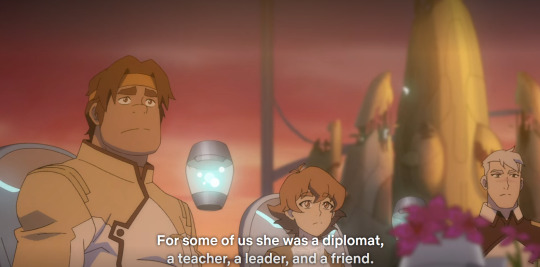
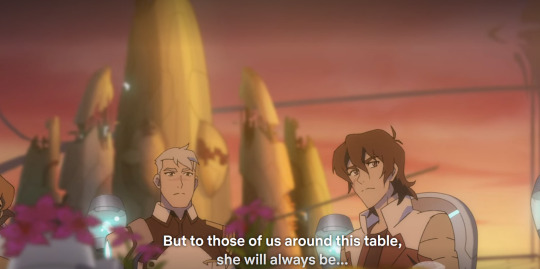

“For some of us she was a diplomat, a teacher, a leader, and a friend. But to those of us around this table, she will always be family.”
The EPs have suggested that, like other shows, there may be ways to resurrect Allura, and there may have been happier endings possible. But again, please see the Theory 1 statements above regarding the massive worldbuilding contradictions when assuming that Allura had to die in the first place.
In which case, hilariously, the EPs have also expressed their interest in creative works that keep going, with plot tensions that require even supposedly dead heroes to return, as in this article here:
“You can kill Captain America a million times and he’ll always show back up.”
So creator statements are just all over the place regarding the finality of “death” or even of “separation” in this universe. We definitely don’t get a body to prove that Allura is dead. And we also know that canonically, there is a place where the rift between the Dead and Living breaks down. And oh, by the way, Allura just regenerated entire multiverse strands that had been destroyed. So even if it’s not as simple as…holding someone’s hand as they step out of the consciousness realm, what canonical detail or limitation would keep her from resurrecting them herself? It is well within Allura’s canonical range to bring back all of these people without dying herself.
Conclusion
Regardless of creator intention, the various contradictions in the worldbuilding itself make the angst of Allura’s death, the memorial statue, the lingering pain of the characters (oof, poor Coran and Lance especially), and all the interviews talking about Allura’s death feel excessively unnecessary. And at the same time, I’ve been very fascinated by what one can do with the details about the Consciousness Realm; the inherent properties of comet-based mechas, quintessence, and alchemy; Lance’s strange marks; and even the odd, last-minute Voltron interstellar space trip surging toward the Allura in the stars, with Blue Lion in the lead:

It appears that Allura could be very much alive in the final screenshot of her in the stars. Through Lance and their shared connection via Blue Lion, she’s maintained a homing beacon for her own reality, activated Voltron to complete a massive interstellar trip to come get her and likely several others—and now, she’s faithfully waiting in the Consciousness Realm with everyone, preparing for a family trip back to their resurrected worlds, in their trusty mechas.
I watched s8 on the day it dropped. I was in a daze about all of its wild and painful messaging. I wrote some unhappy metas about the sheer nihilism of this show. It’s taken me, lol, 1.5 years to actually go back and re-watch several episodes at a time. And I don’t believe this interpretation of the ending would fix every problem in Voltron: Legendary Defender. Sometimes, trying to make sense of this show feels like trying to reconcile quantum theory with classical mechanics, haha. So I’m sure one could poke holes in this post. And to even arrive at these conclusions, I had to throw out or reinterpret some of the worldbuilding and scenes, in direct conflict with the stated perspective of the show’s development team.
But even so...I derived most everything for this interpretation from the show itself. And even if the development team didn’t intend this happy ending of resurrections and reconciliations as I’ve suggested…it seems that this finale—at least while I’m thinking about it right now—is canonically possible and an attempt at consistency with the material provided across multiple seasons. It offers resurrections, redemptions, reconciliations...
Its ultimate message even genuinely coincides with the last episode’s title.
The End Is the Beginning.
And I really like that.
#Voltron#VLD#VLD s8#Allura#Honerva#Lance#Lotor#Shiro#Hunk#Pidge#Keith#Alfor#Zarkon#Allura's not dead at all?#Lotor and others get resurrected and redeemed?#Shiro as the red paladin?#Allura and the paladins reunite?#voltron lion and sincline family space trip?#the lions are planning to return with the multitudes?#unlimited romance potential?#happy endings and redemptions?#lion musical chairs#this is my attempt to make sense of s8 with respect to previous season worldbuilding#it brought me a sense of peace with s8 and with the show's general potential given the ending we received#even if the development team rejects this ending it feels A LOT more consistent with the show's overall worldbuilding#and with the show's messages for hope down to the smaller quirky details like Lance's Altean markings#I cannot get over Allura returning with her friends and family to reunite the past with a better future#and to reunite her own missing pieces back to herself#this idea made my heart light and I hope this post helps lighten your heart too
120 notes
·
View notes
Text
The development of Law’s relationship with Zoro - Part 4: Dressrosa, The Breaking Point (Aftermath)
<<Part I: Before Meeting>> <<Part II: Sabaody Archipelago, The First Meeting>> <<Part III: Punk Hazard, The Alliance (A)>> <<Part III: Punk Hazard, The Alliance (B)>> <<Part IV: Dressrosa, The Breaking Point (The Plan Failed)__ (Saving Law)__(Protecting Law)__ (Birdcage, Pica and Doflamingo)__ (Aftermath)>>
Even though admiral Issho alongside with his men officially apologized to King Riku and the citizens, the king made sure the “outlaws” were hidden from marines. Straw Hats, Law, Bellamy and Kyros ended sheltered in Kyros’s home where he once lived with Scarlet and little Rebecca. First time in a long time, the allied pirates were together again. In the night, Sabo visited the house, but beside Zoro, Franky and Robin, everyone was sleeping. The four had a talk about Sabo’s past and the best time to leave Dressrosa before marines will attack them.
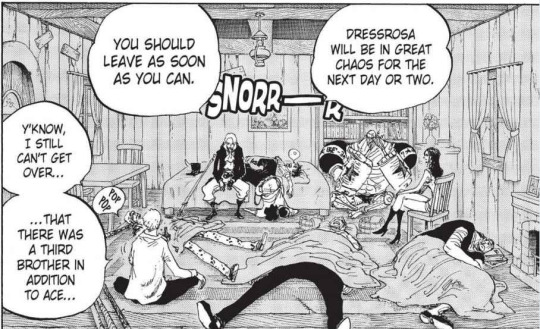
Law’s sleep position was much more relaxed and open than the one from the beginning of Dressrosa arc (chapter 794). Maybe it was just the result of total exhaustion and injuries or maybe Law, after so long of stressing and worrying, finally could relax knowing that A) Doflamingo was in marine custody thus no longer a threat and B) he was safe around Straw Hats.
The available room was small but Law could choose any spot to sleep. Instead, he was shown lying close to drinking Zoro (by frame layout alone, again in between Roronoa and sleeping on bed Luffy, this time without any danger around). Zoro most likely planned to stay awake through the whole night for security measures (he has this habit of sleeping just 3 hours per night after all) and taught by experience, Law didn’t have any reason to doubt that if attacked, the swordsman would protect him, the same as he did during battle.
Law didn’t even bother to pretend he was cautious or wary, he simply slept, trusting allies to take care of their safety.
With Zoro, Franky and Robin being the only one awake, there is a high probability they talked about the latest events. How their fights went, what they learned, what to focus on, what to watch out for in the future with angered Kaido as the next goal on alliance’s list. It’s hard to tell for sure if Robin told others about Law’s choice to stay behind and whether in victory or death, share Luffy’s fate. On one hand, it was a choice made under strong emotions, trauma and even the feel of responsibility for Straw Hat’s wellbeing. A choice made because of very personal matters. On second hand, exactly because it happened under such pressure it was the most sincere side of Law Robin had a chance to see for herself. She and Zoro are the least trusting members of the crew and that night was the best moment to discuss in detail what happened and in the process dispel any remaining doubts about Law as their ally. Both saw his determination and fighting spirit, knew he saved their crew members and kept Luffy out of harm's way despite his own injuries and finally, both had some understanding of Law’s hidden goal in Doffy’s destruction. They may not know the whole truth, just the nature of it, but that was enough because Trafalgar did not betray them. And well, he had the suicide feel about himself what could raise some concerns about him too.
I personally think such talk could happen that night, when memories of battle were still fresh in their mind and everyone out cold beside the three of them. The exchange of information could be another reason for the change in Zoro’s behaviour.
For the three days, the Straw Hat-Heart alliance was left in peace by marines. Once again Law was exposed to Luffy’s antics but this time Zoro acted in a more open way, even showing his more usual irritation at other people’s odd behaviour, including his own captain:
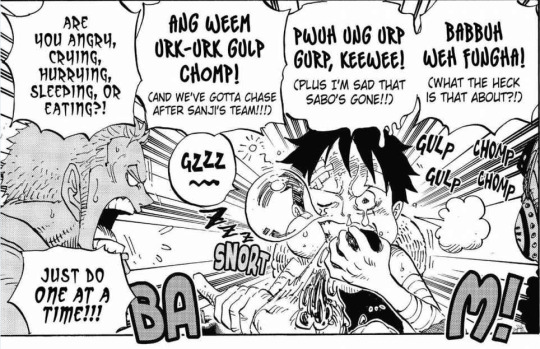
Interestingly, there is a visible shift in the arrangement of characters positions - during battle it was usually Zoro-Luffy-Law and the dynamic changed mainly in face of danger. Now with upcoming frames somehow Law was put more often in the middle between the other Supernovas. Even though Trafalgar still kept some tangible distance from others, judging by their (not so strictly stoic anymore) behaviour, it seems like he and Zoro were now more comfortable around each other.
Then the navy finally made its move against pirates. Unlike Usopp, Zoro and Law didn’t show any distress. Bartolomeo and other fighters prepared themselves for such an occasion by securing for Luffy’s group a safe escape route. Instead of running away with his friends, Luffy decided to visit Rebecca - now a princess - and confront her about her family matters.
Zoro reminded Luffy they don’t have time, so he better get it done quick while the rest will wait in eastern port...

and then again, run in the wrong direction.

At this point, Law may have a good suspicion about Zoro’s no sense of orientation (chapter 797). And who knows, maybe he ran alongside Zoro (on picture below, behind Kinemon and Robin), to make sure the infamous Pirate Hunter did not wander unexpectedly somewhere else… that, or both planned to linger behind and secure the group retreat.
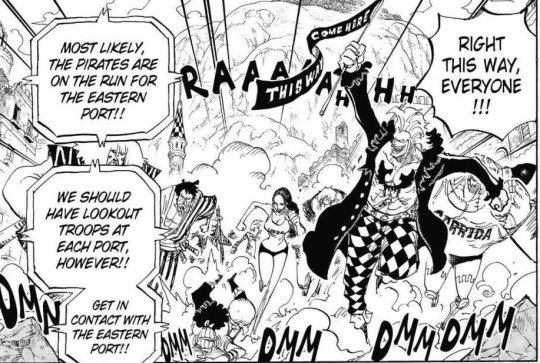
The fellow fighters came to their aid, keeping marines far away from Straw Hats. At the same time, Law disappeared without a word, to find and confront recently arrived on the island Sengoku (unless he did mention his intention to Zoro, while they ran side by side??). Frankly, the manga did not provide the reaction of Zoro nor any other member of Straw Hat crew to Law’s disappearance, so it’s impossible to say if they were worried about him or simply trusted in his strength to return on his own on time.
Meeting with Sengoku was one of the most important breaking points for Law. As it turned out, the former fleet admiral treated Donquixote Rosinante - Law’s savior - as a son. And for thirteen years did not understand why his beloved son didn’t follow the order to stay away from Minion Island.
“One day… a soldier I knew died. He was someone I cared about, someone who meant something to me. I took him in as a boy… and treated him like a son… He was as honest and upright a person as I ever knew… and a valuable, trustworthy subordinate. But there was one time, just once in his life, that he lied to me. I had been betrayed… but there must have been a reason for it. Four things disappeared in the chaos of that fateful day. The Barrels Pirates, the life of my subordinate, the Ope-Ope fruit… and a boy with White Lead disease who was with the Donquixote Family at the time.”
Law admitted he was the boy and confirmed that Rosinante left his post and died because of him. Admitted also he didn’t know if the way he lived was what Cora wanted.
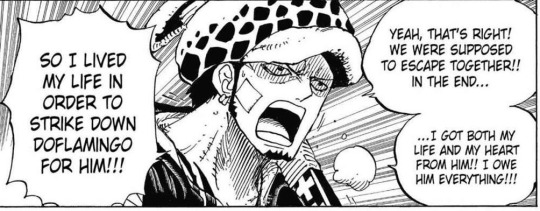
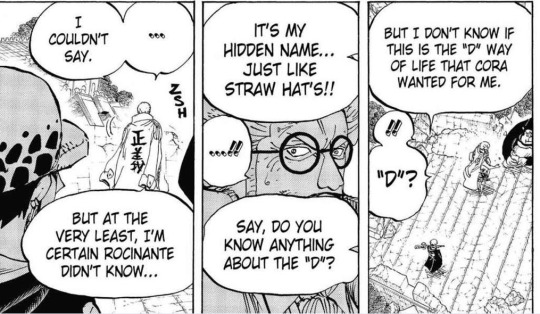


First time in 13 years, Law was assured that there wasn’t any hidden goal in Cora’s decision to save him. The man saw a dying, hurt child with the spark of his brother’s madness and decided Law was worth loving and dying for. It was unconditional love, without any “if” or “but”. The “D.” name and the usefulness of Ope Ope no Mi did not matter. Even stopping Doflamingo meant then little. The only thing Rosinante wanted was to save Law and make him finally free. Sengoku literally told Law to not “attach a reason to the love you’ve received”.
Apparently, english “I love you” does not carry the whole meaning of the original phrase “Aishiteruze (愛してるぜ)”. Rosinante’s declaration was along the “I can’t live without you” level of loving someone (x). Now, after so many years of hiding from Donquixote Pirates, planning and scheming and living just to kill Cora’s murderer, Law finally understood the depths of Rosinante’s love. The breaking point is that: Law at last knows (accepts) he was unconditionally loved and now, is free from Doflamingo for good. He can allow himself to finally live without doubts and regrets the way he wants, without a sense of failing some unknown to him expectations. And I think, to some degree, it is the reason why Law’s secretive / introverted behavior changed into a more open, relaxed act around Zoro and Straw Hats. Because he finally could relax, be comfortable with himself.
Due to danger from admiral Issho, Law couldn’t spend more time with Sengoku and had to run to the rendezvous point. Surprising, no Straw Hats waited for him (in the sense, weren’t shown in the frame). Even more surprising is the lack of Zoro between former colosseum fighters in the frontline of the fight. Anyway, Luffy showed up soon after Law but instead of dodging the blind admiral, attacked him. Because to be Pirate King he must face everyone: Warlords, Admirals and Emperors and beat them down.
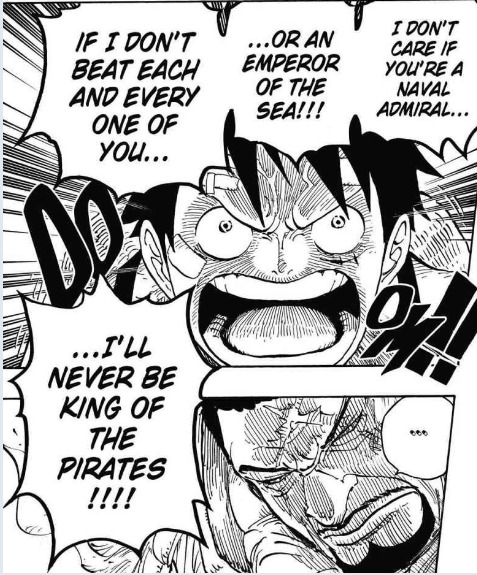
Zoro in general agreed with Luffy’s reasoning (chapter 799) but did not exactly understand the way Luffy fought against Issho, telling his blind opponent what kind of attack he was going to use. The admiral himself was very surprised by that too, but ultimately accepted and even respected Luffy’s weirdness. In the end, Issho managed to send Luffy flying - what happened to be a favorable circumstance for allied fighters. They catched Luffy and despite Straw Hat’s protest, dragged him to safety. Zoro was happy about that too, but for a different reason - he wanted to take Luffy’s place to fight with a powerful enemy. Bartolomeo thankfully managed to stop the battle-lusting warrior.

Law’s reaction to that event wasn’t shown but once again he had a chance to see Zoro’s insanity when it came to fighting a strong enemy. Zoro and Luffy in that regard were very similar to each other.
Straw Hats-Heart alliance finally got on ship, the Yanta Maria and with the help of people of Dressrosa (who under the pretext of chasing the pirates away, were actually protecting them from the admiral's deadly attack), the alliance sailed away safely.
Zoro and Law's reaction to Yanta Maria was visibly distinctive from pleasant shock of others (open jaws). Zoro smiled, Law, judging by the frown, looked unimpressive. Both their reactions were more quiet and toned down.
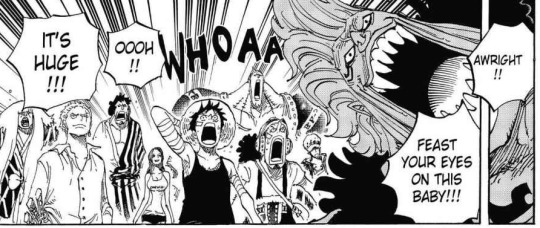
On the ship, Bartolomeo and fellow fighters asked Luffy to drink with them “cups of Father and Sons”, to officially accept them as his underlings.

Luffy of course refused, because he A) didn’t like alcohol and B) didn’t want to be captain of such a big fleet. Zoro warned his allies they wasted time trying to change Straw Hat’s mind (and to just give the sake to him). Yet the fighters were ready to force Luffy into accepting the drink. Further Luffy’s explanation only confused everyone (beside Straw Hats) even more. Including Law.

And then Law’s attention immediately turned to Zoro, who, taking advantage of the opportunity, started drinking sake from Luffy’s cup to Usopp’s displeasure.
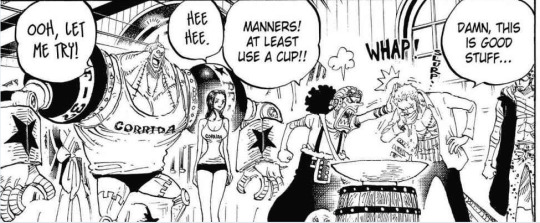
Finally, Luffy managed to explain his reasoning:
“If I ever think we’re in trouble… I’ll shout for your help. Then you can come save us! I don’t have to be a boss or a great pirate, right?! If you’re in trouble, call for us!! We’ll come and help you!!! I won’t forget about how we fought Mingo together!!
And the Seven Leaders admired and accepted Straw Hat’s decision. But since Luffy was all about freedom, they simply followed his example. Whether Luffy liked it or not, they decided on their own to make him their boss.
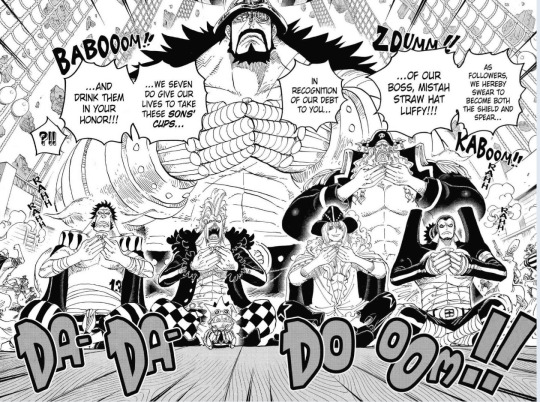
Law thus witnessed the founding of the Great Fleet of Straw Hats. And yet, somehow it looked like he was more interested in Zoro’s drinking sake behind Luffy’s back.

When party started, everyone celebrated their great victory (chapter 800):
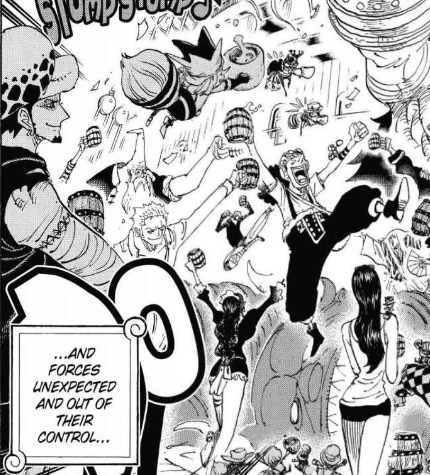
Luffy, like always, was in the centre of everything. Law, though smiling, kept his distance from Zoro and other partying people. But soon after that Law’s personal space was invaded by Zoro.

The anime expanded this little moment, first showing Zoro approaching Law sitting alone, asking to join the rest. And then, ignoring any protests, just threw his arm around the other man’s neck. Law’s face spoke how much he minded such treatment and had no dignity about that:
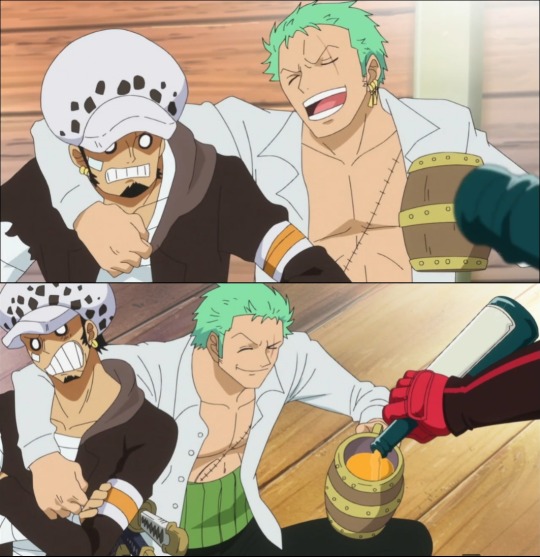
During parties, Zoro always spent his time sharing alcohol with people who fought side by side with him (Paulie, Water 7/Enies Lobby) or actually were his opponents (Braham, Skypiea). Zoro didn’t have a habit of forcing people to drink with him or asking (introverted) person who clearly wanted to be alone to join the bigger group. He himself rarely joined larger groups and usually just sat somewhere far from the noise with a few people around. So, Zoro most likely understood Law's isolation since he used to do so himself. Here though he was the one invading Law’s personal space and not giving a damn if the man was happy about it or not. On second thought, if Law didn’t want to join the others, it made sense for Zoro to join him. In a sense, it could be Zoro’s way to break the ice between them. What is even more interesting, considering the palpate distance he kept from Law at the beginning of the story. The second important detail - Law could easily get out of that situation by using Ope Ope no Mi powers. A simple switch of the places and he would be free for good. Yet Law remained, despite how awkward and/or outside of his comfort zone it was.
We may only wonder what made Zoro act in such an uncommon way. Was that respect for Law forged in the heat of battle? Did it bother him that Law after everything was done, still isolated himself? Did it look like Law felt discomfort to be around people he barely knew or interacted with and who all pledged loyalty only to Straw Hats, thus Zoro decided to keep him company?
Zoro initiating physical contact in itself is an uncommon occurrence. Because as much as Straw Hats pirates can - and will - invade Zoro’s personal space, Roronoa is not exactly the type of person open to such contact. Once again, the shift between the beginning (visible distancing) and ending (invading Law’s personal space) of the Dressrosa arc is tangible. Somehow between one and the other, breaking point in Law and Zoro’s relationship happened and changed for good their dynamic. What was seen day(?) after the party (chapter 801):
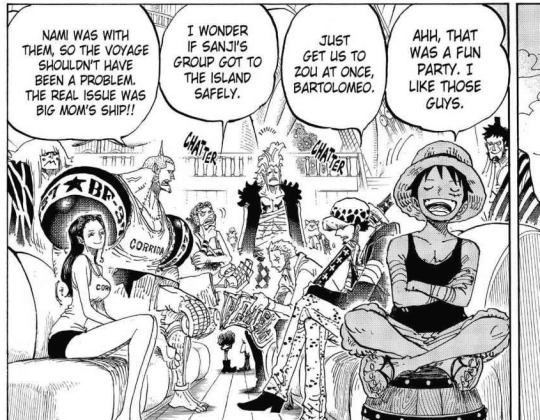
Law and Zoro sat close to each other, the previous distance gone. Zoro was reading newspapers, indifferent to his surroundings - instead of facing and observing the Heart captain, like he used to do at the beginning. Both men looked like they were comfortable around each other, even despite - or maybe, because of - the shared (forced?) drink. The change in Zoro’s behaviour is diametrical.
Like was said at the beginning, Dressrosa Arc is one big breaking point. It changed the status quo of pirate alliance and Luffy’s position, from rookie pirate to leader of a powerful fleet. It will lead to the complete dissolution of the Shichibukai system and for good push the main hero into collision with Emperors. For Law alone, Dressrosa was like opening old, still not healed wounds but also so needed a moment of catharsis. He was ready to die there, but was saved time after time by allies. In a sense, it was the final test of how strong the alliance was before facing angry Kaido.
Law changed a lot through the course of action. Or maybe not really changed, but like allowed himself to show hidden emotions and trauma. The cold-blooded, scheming pirate who planned to use Straw Hats crew (and spare his own) turned out to be a man willing to sacrifice himself to finish what his savior started but couldn’t do himself. Who came to believe in Straw Hats, as the ones who made miracles happen. Not only Luffy, but the crew as a whole.
The same as Zoro finally saw Law in hopeless, awkward, sometimes outright humiliating situations (anime extension), Law’s impression of Roronoa cracked too. No sense of direction, insanity to laugh at the dangerous enemy and enjoying the thrill of fight, the fondness of alcohol -- all of this created anew image. This time more flawed but at the same time, more real, human. Despite the flaws and awkwardness of previous situations, both proved to be strong-willed, cool-headed warriors one may rely on in difficult times. Zoro stretched out his hand to him, broke the ice, abandoned the distrust that distanced them for a long time. It seems like Law was finally fully accepted by Roronoa and all unsaid things between them settled down for good.
At the same time, the arc showed their similarities. Both were the quiet ones, the type of people who kept distance from others. The ones with pragmatic thinking in contrast to Luffy’s chaotic madness. Zoro for sure was a helpful presence during running from enemies and meeting a weird fighter after another, especially since he did try to keep his captain in check. That it didn’t work for a long time is a different matter.
Anyway, looking at the beginning and end of Dressrosa arc, there is a visible change in how Zoro and Law acted around each other. How the neutrality changed into something more comfortable.
Here comes things worth examining a bit more.
↪ The Seven Leaders pledged loyalty only to Straw Hat Pirates. As long as alliance between Luffy and Law will work, this is not a big issue and to take down all Emperors, every additional help was good. But if ever those two pirate crews will fall apart, Luffy literally just gained a powerful fleet, thus has advantage over rival captain.
↪ Straw Hats & Heart captain worked together to take down Doflamingo. Luffy of course was the one that finished the enemy, but overall, Luffy’s victory was a result of teamwork between pirates, colosseum fighters, marines and common people. As much as Trafalgar Law was well known as the Shichibukai, Luffy and Zoro were in fact the ones that made the biggest impression on people (colosseum fight, defeating Doffy & destroying Pica) and actually interacted during battle with other fighters. Frankly, both showed their charismatic nature that made people believe in and follow them. Luffy became the hope of the whole country. Zoro was the spark that united people to stop the birdcage and brought Luffy the needed time to recover. Law is powerful and has a reputation and knows how to deal with different people to get what he wants, but he is not really good at interhuman relationships in general. Luffy gains friends on the left and right. Zoro, despite being asocial, rude and introverted person, has the impressive air about himself that often makes him look like the coolest person who is not afraid to challenge everything and everyone; for whom impossible does not exist (destruction of Pica, stopping birdcage). Law… kinda lacks in that department.
↪ Because of the made impression on other fighters, there is a big chance Law may have heard some retelling of the events during the party. Luffy and Zoro aren’t men who brag about their exploits, but Bartolomeo and his companions had a lot to share about battle. With so much alcohol and so many strong individuals that were very impressed by Straw Hats deeds, it seems logical that tales of battle would sooner than later be told. Especially by devoted fans like Bartolomeo. Zoro’s daring plan to defeat Pica and stop Birdcage could be recalled by those fighters who saw it themselves, filling Law with missing fragments of the battle.
↪ Frankly, shonen mangas have this one upside down that the final boss must be defeated by the main hero. Which means that characters who actually could do something useful (damaging) to the enemy are pushed to the sideline. Like Robin, who can snap a person's neck from far away thanks to Hana Hana no Mi. Or Zoro, who could join the other Supernovas in their fight against Doffy (either before Law’s threatening injury or after, instead of stopping the birdcage). Or dwarf princess could heal Luffy for a few minutes to finish Mingo once and for good. It’s not exactly a complaint, because it's the standard formula of One Piece story, but because of such, Law and Zoro were pushed into the background, for Luffy to shine. For most of the arc, Luffy was the main figure in the dynamic of Supernova Trio. They did not interact much in words, but the layout of frames - the character position and background activities - created the feeling of the slowly forming bond between Zoro and Law. Now, after Doffy’s defeat, there is a shift next to whom Trafalgar sticks (Zoro) and Luffy is unnecessary for them to interact on their own.
↪ Law didn’t care how high was the newest reward for his head. In contrast, Zoro was pleased to learn his own increased a lot. Even asked for alcohol to celebrate. What could turn into another moment of Zoro dragging Law into drinking.
↪ The last detail (though I’m afraid it may vary from one translation to another) is the way Law addressed his allies. Luffy usually was the Straw Hat-ya. The girls were titled as Nami-ya and Nico-ya. Usopp as Nose-ya, Sanji as Black Leg-ya, Chopper as Tony-ya. Unless I missed it, I don’t think Law addressed Zoro directly to use either his name or made up nickname. They really didn’t talk much throughout the course of the story. There is a chance it happened after freeing Dressrosa - either during the three days when everyone waited for Luffy to wake up or during the party, once alcohol was shared. Zoro, depending on translation, called him either Law or Traffy (or similar form of the nickname).
With the chapter 802, the Dressrosa arc can be considered closed. Now, the Straw Hats-Heart pirate alliance sail to meet their missing crewmembers and to prepare for the fight with angry Kaido. How truly comfortable Law and Zoro became around each other will show the next place: Zou.
#one piece#roronoa zoro#trafalgar law#The development of Law’s relationship with Zoro#zoro & law#monkey d. luffy#straw hat grand fleet#my analyze#finally the dressrosa is done#dressrosa arc#man this arc was painful to write down#so many things happenings#on one hand so little zoro & law moments#on another the effects and differences between zoro & law and luffy gave a lot to think about
41 notes
·
View notes
Text
Shapeshifting: Solaris and True Alienation
In Stanislaw Lem’s 1961 novel of the same name, Solaris is an alien planet that “materializes physical simulacra”— any members aboard the space station slowly circling the planet will begin to have interactions with figures from their pasts, those figures that left the greatest impact on their psyches. The ocean itself manifests many forms that fall under different categorization, such as mimoids, symmetriads, etc., which arise mostly as singular architectural feats and ever-evolving foamy, stretchy-then-solid, growing-and-shrinking structures that can be many miles in dimension; those that study these phenomena are called solaricists. The study of Solaris developed from a more esoteric theorization of what the ocean actually “is”:
“For some time one popular view, eagerly disseminated by the press, was that the thinking ocean covering the whole of Solaris was a gigantic brain more advanced by millions of years than our own civilization, that it was some kind of “cosmic yogi,” a sage, omniscience incarnate, which had long ago grasped the futility of all action and for this reason was simply maintaining a categorical silence towards us.” (Lem)
This evolved into a decidedly scientific investigation of how Solaris ‘works,’but no matter how many studies were done and how much a desire for First Contact might’ve been present aboard, the ocean didn't attempt to reveal anything about itself — to the crew, it seemingly only sought to essentially conduct psychological experiments on them by creating “empty” doppelgängers of critical figures from their pasts who cannot die.

The book centers around Kris Kelvin, an at times neurotic, at times deeply detached psychologist. In his youth, he knew and was in a relationship with a young woman named Harey, who ultimately ended up killing herself after Kris ended their relationship and implied she was weak. Once Kris begins seeing, speaking and interacting with the simulacra of Harey, he questions his own sanity, and conducts experiments to prove to himself that he is sane — and when in the lab, realizes the other crew members have done the same. We never learn the details of the other crews simulacras beyond an interaction in the beginning of Kris’ stay, and fleeting glimpses of identifiers — but it is implied that they’re haunting enough to drive the crew to madness and suicide, such as in the case of Gibarian, a former professor of Kris’ and fellow crew member who committed suicide right before Kris arrived on the station.
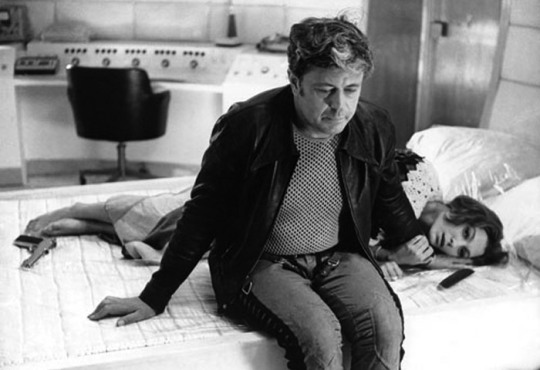
Harey is Kris’ appointed simulacra, or shapeshifter, if you will. What is a shapeshifter? Basically an entity with the ability to change into a different shape or form; It can be the act of a human turning into an animal (commonly seen in creatures such as werewolves, vampires and the like); an animal shapeshifting into a person; a person into a plant or object; and on, including gods turning into clouds, gods turning other gods into any myriad of animals or objects, etc. Shapeshifting is key in shamanic practice and totemism, and entails transformation into a different f o r m, precipitated by an altered state of consciousness within the shaman, aided by substances, rhythmic driving, and the like:
“[S]hamanism and hypnosis … use … the same dissociative state of consciousness, which in shamanism is referred to as the shamanic journey, or ecstatic flight, and in hypnosis is called the hypnotic trance, or simply trance. Neurophysiological and empirical evidence support the view that the shamanic journey achieved without the use of hallucinogenic substances, that is, with the aid of musical instrumentation, chanting, and similar phenomena, elicits the same EEG profile as the hypnotic trance state. In addition, experiential phenomena characteristic of the shaman’s ecstatic flight, such as shapeshifting, contact with imaginal agents, and the like, can likewise be achieved in hypnotic trance” (Walter).
For this entry, shapeshifting is one conscious entity shifting into another entity who is, by necessity, conscious to some degree. We find shapeshifters from stories that span the world and millennia — such as the character of Merlin from Arthurian Legend:
“In the Arthurian cycle, the wizard Merlin enchanted Uther Pendragon, making him look like the husband of Igraine so that she would gladly sleep with him. Merlin knew through augury that this mating would conceive the child who would later become King Arthur. One tool for accomplishing such shapeshifting was the spell known as fith-fath, used to transform one object into another and also to confer invisibility.” (472, Walter)
(I just really enjoy the word fith-fath)
In the Cherokee tradition, there’s the story of the “Stone Coat,” a monster covered with scaly armor from head to toe who could take human form; Stone Coat ate the livers of his victims while in the shape of an old woman, after puncturing their skulls with a crooked finger (136, Young). Stone Coat took the form of an orphan, who then ate other children’s livers, and was subsequently banned from town. Knowing Stone Coat is approaching, 7 menstruating women lay along the path in wait — he vomits blood crossing them, and, knowing he is dying, asks the people to build a fire and burn him. As he burned, he sang songs, songs that eventually became traditional Cherokee songs; “His death, he said, would unleash disease in the world, but the songs he taught them would cure it.”
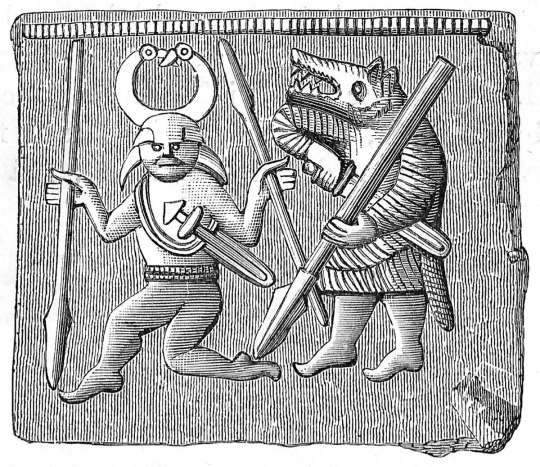
In the case of Old Norse, with regards to Berserkers, shapeshifting more closely approximates a shared state of consciousness generated among animal cultists, leading to murder and rape under the influence of rage:
“It is proposed by some authors that the berserkers drew their power from the bear and were devoted to the bear cult, which was once widespread across the northern hemisphere … To "go berserk" was to "hamask", which translates as "change form", in this case, as with the sense "enter a state of wild fury.”
In Asia, the kitsune (🇯🇵), huli jing (🇨🇳), or kumiho (🇰🇷) are mythical foxes with 9 tails, that are at least 1,000-years old and have attained the boon of shapeshifting. These creatures are known for turning into young women who eat the hearts or livers of young men. In Korea, the kumiho is always malignant, while the Japanese and Chinese variants are morally ambiguous. Across cultures, if a kitsune can last 1,000 days without killing or eating a human, they can become fully human.
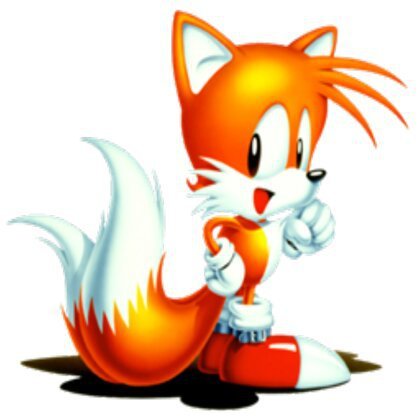
There are myriad reasons why Solaris is a unique shapeshifter experience, considering shapeshifting so often relies on either mythical entities with mythical powers, or altered states. With Solaris, we have an “entity” who can never be perceived directly, and we never learn how Solaris does what it does — Lem intentionally chose an ocean as to avoid personification and thus satisfaction of “First Contact.” Solaris creates an experience of True Alienation — because Solaris can “[see] into the deepest recesses of human minds and then [bring] their dreams to life,” but the observer knows that wish-fulfillment is impossible, making the experience of Solaris a deeply disturbing one which highlights the limits of our physical systems and of our human comprehension.
We never come to understand the intent of the manifestations that haunt the crew observing Solaris, though later in the book, Kris ventures out onto the planet itself for the first time ever, after Harey has finally died indefinitely of her own accord; This experience changes his perception of the planet itself, realizing it is actually slightly timid, if not a bit naive, observing and reacting to new information, interacting momentarily with Kris’ hand. In the absence of understanding, there was forgiveness of the planet itself, and the psychological torment endured by Kris and the simulacras.
Often, whether in literature about shamanic rituals or on galaxy-🧠 backwater forums, you will find discussion of shapeshifting paired with possession. Shapeshifting and possession are parallel phenomena, though possession is internal. Harey is both real and not real simultaneously; Harey knows she is and knows she isn’t; and Harey can never be far away from Kris, at least in the beginning. If Kris is not visible to Harey, she will enter a fugue state until she is reunited with Kris again, at times causing herself fatal physical harm to remove obstacles to him — this possession “reveals” Harey to truly be Solaris itself, her body receiving a hard reset via near-death experiences.
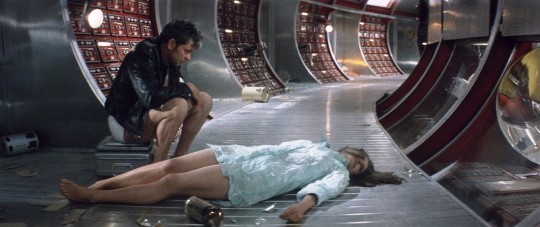
In the beginning of the novel, Harey has a truly amnesiac response to notions of “the past” — she quickly creates an excuse for her behavior or her origins whenever she materializes on the station. As time goes on, Harey noticeably becomes perturbed by her inability to know herself and comes to realize that she is not “Harey”at all. As opposed to following the natural progression of a developing consciousness, arguably going from tabula rasa “nothing” to “something,” Harey goes from believing she is “something” to knowing she is “nothing,” a figment created by the parsed memories of another living being, in a way mirroring terrestrial Harey’s timeline.
Solaris functions as the embodiment of what Rudolf Otto called the Mysterium Tremendum et Fascinans; the numinous, the unknown. Under electron microscope examination, blood samples from simulacras are devoid of electrons, instead being composed of neutrinos, and a specialized machine is ultimately needed to kill Harey at the end of the book because of this. Nothing like Solaris has ever been seen before, let alone conceived of by human minds, and when 106 members of the space station die in one freak accident while exploring a spontaneous formation on Solaris long before Kris ever arrives, humans subject it to nukes in “retaliation”. Humans had a stronger desire to destroy the unknown than to allow the unknown to exist at all. But Solaris was seemingly unscathed, and afterwards, public interest in Solaris waned, and the simulacras began to appear onboard the station.
What makes the unknown of Solaris more exaggerated is its observation, even experimentation, on the crew. It is always learning about You — You cannot learn about It. And we can never know if it is learning from its experimenting, if its experimenting is leading to something, some conclusion, at all. It becomes a true black mirror, reflecting back at the crew that which has psychically harmed or affected them the most to try to understand that hurt, because hurt sticks the most :’ ).
Very often in shapeshifter stories, the concluding action is to kill the shapeshifter because it is deemed malevolent. Shapeshifting is obscure, it is dark, and it is unknowable except to those shapeshifters with access to it. Shapeshifting physicalizes the Shadow, and conceptualizes the existential chicken-and-egg of knowing decay, death and rebirth are inevitable, just maybe not in the ways we’d hoped — bask in the Shadow and temper the compulsion to kill the darkness.
Bibliography:
Lem, Stanisław. “Solaris,” Walker, 1964.
Walter, Mariko, and Eva Jane Neumann. “Shamanism: An Encyclopedia of World Beliefs, Practices, and Culture,” ABC-CLIO, 2004.
Young, William A. “Quest for Harmony: Native American Spiritual Traditions,” Hackett Pub. Co., 2006.
& Wikipedia lul
#solaris#stanislaw lem#tarkovsky#shamanism#shaman#shapeshifting#shapeshifter#religion#philosophy#consciousness#berserk#berserker#kitsune#shadow work#shadow#cherokee#hypnosis#alienation#sci-fi#scifi#science fiction#fiction#polish literature#native american#movies#film
11 notes
·
View notes
Note
Pt. 1-Hi! I'm a Black woman writing a Fanfiction for an anime series called Food Wars and I'm creating a sister and brother who are half-Lakota (Itazipcola Band) and half-Black American. They're going to a Japanese Culinary High School, the same school their great-uncle (Kiowa) went to when America was in Japan, post-WWII for a few years as his father was in the army. It's a very competitive school with diverse characters and cooking styles/types. They both want to travel and see a new country.
(continued) They live in Sioux Falls, SD after moving from the Cheyenne River Rez years ago. The family owns a Catering company with Native, African, and American Southern food (Mom is from VA) that does Showcasings, Chef Demos, and feeding the people within both communities while mentoring the youth. Annie (Older sis) wants to be a Pastry Chef as Andrew (little bro) does mostly savory, especially BBQ. Annie was on a kid's baking show as Andrew won kid's BBQ competitions. Both siblings want to help their communities by spreading awareness about poverty, suicide, and other stuff. They are active in their Native heritage. I did research in Natives in Japan, and I found that it's a bit mixed. Some people don't know about Natives, or that they do but only through the news and old western films. There's this one guy who went to a tribe to learn about the culture and he went back to Japan to teach his students about how the Natives truly lived. There's a Native jewelry store in Tokyo So some Japanese do know about Natives, I want to write a few small scenes where the Japanese students ask questions that are stereotypical about Natives and Black people, but they learn from the siblings. Annie begins to have a crush on a boy who is mixed indigenous (Ainu/Saami), but isn't connected to those cultures, because of his Ainu dad dying and Saami mom leaving him. He was adopted by a rich Japanese/Danish family. I want him to learn more about his heritage after falling for Annie and begins to heal from his past through learning about the Saami. Before he didn't want to do anything with them due to his mom. Andrew falls for a Japanese girl who does Medicine Cuisine. He's a expert in Nutrition and tries to help his people's health issues. They have a cute relationship. I thought of these characters just like any other person. I'm Black and I don't like seeing stereotypes. Annie and Andrew love music due to their dad formerly being in a band with only one album. They're both crafty with the Arts due to their grandparents on both sides teaching them. Annie is more outgoing, goofy, and blunt than Andrew but she enjoys the simple stuff in life and loves fashion (Vintage 60s/70s and Punk) Andrew is more quiet and shy, but not antisocial. He just likes doing his own thing while teasing his sis on her shortness and crush. He likes comfy, Punk clothing. I was just wondering what is offensive and not. I want to show their food and aspects of culture, like Powwows (I've been watching videos on Lakota Powwows) and I've been wondering if there's a coming of age ceremony. I don't want to show it just mention it. Is this where people get their Lakota name? I don't want to do religious ceremonies since that's sacred and also I'm not really religious, but what if I want to allude about it? Sorry that this was way too long!
Okay, this is a huge question but I’ll do my best to answer it with the GIANT caveat that I’m not indigenous and am only answering to the best of my knowledge. If any indigenous followers--particularly those with experience in Japan/with Japanese culture, though of course all are welcome--have thoughts or feelings, as always feel free to add more information and/or correct me!
A few observations that jump out, based on your description of your narrative framework:
Their food. Okay, while I know absolutely nothing about the food cultures you describe, I’m a huge fan of connecting with your culture through your food (and your stomach!) so I love this framing. That being said, to my knowledge African American food is fairly distinct from African food, with the former more likely to be in their cultural background given your description (obviously, in this situation you’re the expert on Black culture so feel free to totally ignore me here).
Andrew’s food interests. Related to the previous bullet point, based on my understanding Medicine Cuisine and Nutrition would be super interesting focuses for him given his cultural background. It’d be super cool to seem him integrate his various cooking specialties and heritages into nourishing food to support his people.
Knowledge about Native Americans in Japan. I do think it’s likely accurate that unless someone in Japan has personally done research, the average Japanese citizen probably knows very little about indigenous Native Americans in the same way the average American knows very little about Japanese indigenous ethnic groups.
Relatedly, I think it makes sense for their Japanese classmates to ask stereotypical questions, but you should steer clear of just plain offensive questions. As you likely know, answering stereotypical questions about your identity and heritage is exhausting and should be treated as such within the narrative. Your characters are in school to educate themselves, not to educate their classmates, so while the latter may occur sometimes I don’t think it should be their focus. So while the intent of the questioning scene may partially be to help answer readers’ questions about Annie and Andrew’s heritage (and Black and Lakota culture to an extent), remember that the ultimate goal of representation is not to educate others but to help people within those demographics see themselves on the page. And more likely than not, Black and Lakota readers won’t want to see characters representing themselves having to answer the same repetitive questions they face down all the time.
I know you only mentioned him in passing, but I have a lot more thoughts specifically about Annie’s mixed Ainu/Saami crush. I don’t want to tell you *not* to write him but I do think there are several pitfalls you need to carefully avoid moving forward.
His Saami mother. There’s a big stereotype around POC abandoning their children, being absent or flighty parents, or otherwise just failing to properly nuture their children. While I’m unaware of any specific stereotype regarding indigenous parents, I would tentatively say that doesn’t mean those stereotypes don’t exist, so tread carefully. That being said, I do know there’s a stereotype about indigenous people being alcoholics, so you should absolutely avoid characterizing his mother as such because as an outsider, you don’t have the power to subvert that stereotype.
His relationship with his heritage. I would also be very cautious while writing his arc of reconnecting to his heritage. While reconnecting is unfortunately a very real (and very under represented) process for indigenous people, it’s an extremely difficult and personal process that I don’t think outsiders are qualified to write in-depth about. Though I don’t think you should necessarily gloss over his reconnecting process, I do think it should perhaps be a side character arc, rather than his defining character arc. For example, he might mention to Annie that her passion for her heritage has inspired him to research his own family, or else maybe he’s pictured buying a book on the Saami language. (The current discussion around Rick Riordan’s portrayal of Piper’s imperfect reconnection to her Cherokee heritage makes some really good points, so I’d check that out if you’re familiar with his books. I’d be happy to link you if you’re curious.)
His adopted family. I have to admit--as the daughter of a transracial adoptee in a family full of transracial adoptees, this framing makes me very wary. While I know transracial adoption parents likely have only the best intentions, the adopted child themselves often end up hugely disconnected from their birth cultures. It’s often an extremely stressful and traumatic event, especially in cases where the adopted parents don’t learn about their child’s birth culture themselves and/or only teach the child their own cultures (in this case, Japanese and Dutch). Honestly, with all due respect, I have yet to see any fictional narratives that properly address the trauma of transracial adoptions and given everything else going on in your writing, I’m not sure how well you would be able to write about it. More in the next bullet point.
His extremely mixed heritage. While I don’t want to come across as rude, I do have to ask: what’s your intention behind making a single side character with four different cultural backgrounds, especially backgrounds that you the author don’t share? The reality is that, no matter how much research you may do, these four cultures--Ainu, Saami, Japanese, and Dutch--are very rarely found in combination, and I think you’d be hard pressed to find any #ownvoices accounts from similar scenarios that you could hypothetically draw on to write more accurately. As a result, you’d know very little about how these different cultures meld together, and you’d have almost nothing to go on to write about his mixed multicultural background and the tensions that come with it. While I understand you may be attached to his parental setup and his backstory, I would highly advise simplification to avoid straying into territory you neither understand or are qualified to write about. Given your focus on his reconnecting, I would probably recommend keeping his Ainu father alive and cutting his adopted family. That way, you cut the number of unknown cultures in half and you can truly dedicate yourself to writing his Ainu heritage and his reconnecting process well.
With regards to your actual question about Lakota religious ceremonies, as a non-indigenous person I’m definitely not qualified to answer specifics about Lakota coming of age and naming ceremonies. That being said, I know this: Native American ceremonies, rituals, traditions, and lore are often closely guarded and not shared with outsiders. And I don’t just mean outsiders don’t share in the ceremonies themselves--outsiders often can’t even learn about the ceremonies because the knowledge itself is guarded. (This information is secondhand from my Blackfoot professor last year. If I’m wrong or if any indigenous followers have more accurate information, as always I’m open to critiques and suggestions!) As you continue researching this, I’d definitely be mindful of the source; if it comes from an official Lakota or indigenous source, it’s likely okay to share or discuss, but if all you can find about Lakota religious ceremonies is from, like, someone’s blog or Facebook post or something, then that information likely wasn’t approved to share and you shouldn’t write it into your story. Given that this seems to only be a character detail mentioned briefly, you may be able to simply mention the characters’ Lakota names in passing without referencing the ceremony itself.
Sorry for the long response, and I hope at least some of this information helps!
(Also, if you read this post, this is a good example of a really well researched and thought out ISO Sensitivity Reader question. Obviously, I’ve provided what information I can and this individual seems to have done lots of research, but the execution comes down to... well, the actual execution.)
#long post for ts#ISO Sensitivity Reader#writing about race#writing indigenous characters#this is a whole essay question with an essay response whoops#bullet point tw#one of these days I will write about the multigenerational harms of transracial adoption but today is not that day
15 notes
·
View notes
Text
[Chapter 60] Years upon years
A foreword PSA of sorts -- my posting frequency has been abysmal over the last year and a half, so thank you to those kind people who continue to follow (or perhaps just let me rest and gather dust in your “following” lists) and those new faces who have clicked on my blog in recent months.
Thank you. Truly.
---
I’m not really one to make New Year’s resolutions (maybe that means I lack resolve), but here are some observations as we reach both the end of 2019 (conclusive) and the decade (debatable but an annoying debate).
(1) If you’re a long-time follower of this blog, then you’ll know that the concept of time, as a force, fascinates me. I love visualizing time as a river--eroding, influencing, shifting the very landscape of our lives. Time, with a relentless pull or drag not unlike gravity, has the ability to distort perception, change memory, and, ultimately, affect how we choose to live.
What’s also powerful is the concept of time as a resource and the impact that “free time” has on one’s own vitality.
I’ve learned this year that having time for myself and to myself is tantamount to breathing. If anything, working in an environment where time was never my own became a suffocating experiment. Being able to sit here and type this post is a wonderful privilege, courtesy of time.
Reader, your time is precious. Use it with caution and care.
(2) This blog’s changed greatly since its inception. From Rupi Kaur-esque attempts at poetry to some writing of which I’m fairly proud, it’s apparent how much I’ve changed over the past 7(!) years that this blog has been alive.
I’ve decided not use the word, “grown,” because life, at this point, feels less linear than it does amorphous.
Sure, time continues to march forward--aging is a relatively straightforward concept (see (1)). But, #adulting, is certainly no longer akin to the tiered scavenger hunt that was academic life. Gone are the stages and accomplishments of exams, semesters, internships, and jobs. For now, we just float in the proverbial pond, jumping from lily pad to lily pad, until we get offed by the predator known as death (further digression: it is increasingly disturbing to me when I read about people dying and then those people are identified as 28 year old’s or younger).
I digress, but what I am trying to say is that I’m happy to have kept this capsule of memories through the years. Writing was, and continues to be, a place of solace for me.
It’s funny because when I’m with friends that I met through Tumblr, we always remark about the “death of gaysian writer tumblrs.” We’re being dramatic, but certainly, it’s a different place from way back then (NSFW content ban, included). Many of us have moved on with our lives, and for the dusty blogs that remain, they’re simply snapshots of the past.
Here’s to writing and choosing to sit with my thoughts. Memories, memories. They’re powerful things.
(3) The 2020s loom, and already things appear to be thornier and more difficult to navigate than originally anticipated.
Let’s just say, Mother Life has conspired with Lady Time, and they both continue to keep me on my toes.
I have no adages or aphorisms for you, dear Reader, because I, too, have no idea what is coming next. A couple of years ago, this may have given me great anxiety and distress. These days, I’ve learned to give fewer fucks. That said, the unknown isn’t a fun place to be.
Perhaps through character building or, more likely, the weathering down of my will, I’ve learned to be more flexible in life. Rigidity sows dissonance sows anxiety sows stress sows aging sows death (see (1) and (2)). It’s better to just accept the things as they come, as they are, for life is too short to always battle when things aren’t in alignment with expectations, ideals, desires.
Sometimes we lose more by refusing to lose (I guess I did have an aphorism).
---
Reading has been my other place of solace. I didn’t seek it as often this year, but some books to share (in no particular order):
- Pachinko by Min Jin Lee - Trick Mirror by Jia Tolentino - Bloom by Kevin Panetta - On Earth We’re Briefly Gorgeous by Ocean Vuong - The Music of What Happens by Bill Konigsberg
---
Happy 2020 to you~
26 notes
·
View notes